History Of Knowledge Quotes & Sayings
Enjoy reading and share 100 famous quotes about History Of Knowledge with everyone.
Top History Of Knowledge Quotes
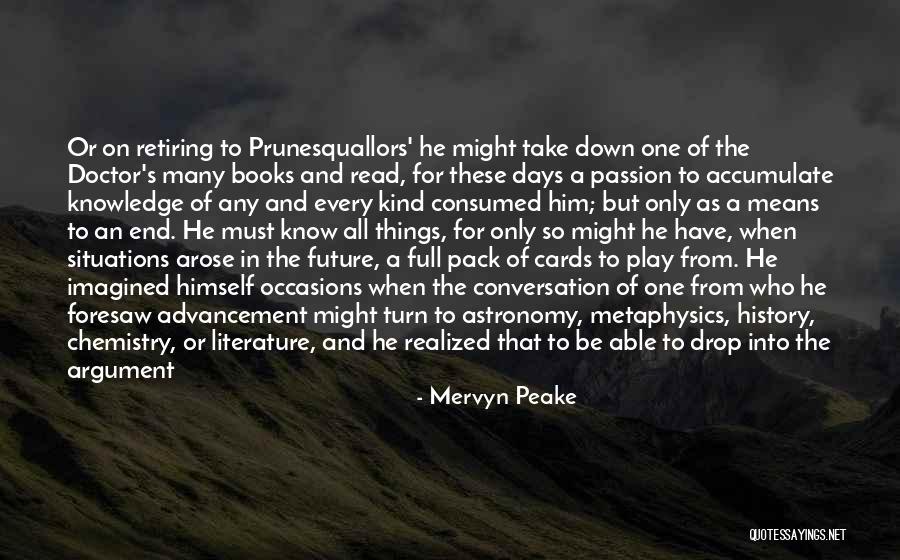
Or on retiring to Prunesquallors' he might take down one of the Doctor's many books and read, for these days a passion to accumulate knowledge of any and every kind consumed him; but only as a means to an end. He must know all things, for only so might he have, when situations arose in the future, a full pack of cards to play from. He imagined himself occasions when the conversation of one from who he foresaw advancement might turn to astronomy, metaphysics, history, chemistry, or literature, and he realized that to be able to drop into the argument a lucid and exact thought, an opinion based on what might *appear* to be a life-time study, would instantaneously gain more for him than waiting until the conversation turned upon what lay within his scope of experience. — Mervyn Peake
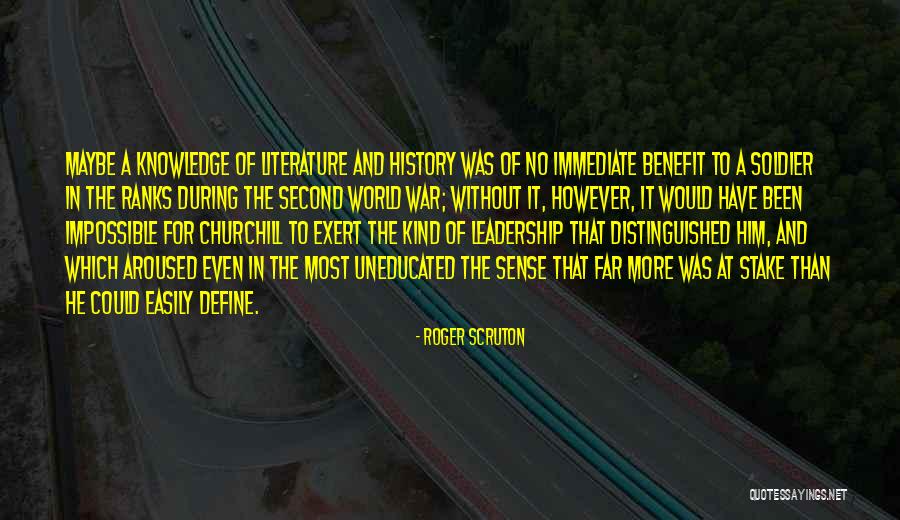
Maybe a knowledge of literature and history was of no immediate benefit to a soldier in the ranks during the second world war; without it, however, it would have been impossible for Churchill to exert the kind of leadership that distinguished him, and which aroused even in the most uneducated the sense that far more was at stake than he could easily define. — Roger Scruton
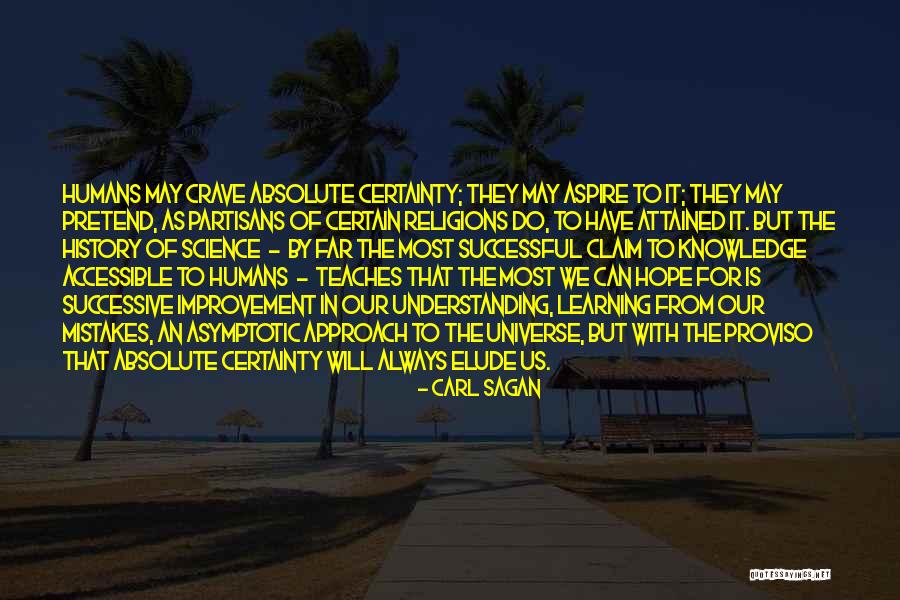
Humans may crave absolute certainty; they may aspire to it; they may pretend, as partisans of certain religions do, to have attained it. But the history of science - by far the most successful claim to knowledge accessible to humans - teaches that the most we can hope for is successive improvement in our understanding, learning from our mistakes, an asymptotic approach to the Universe, but with the proviso that absolute certainty will always elude us. — Carl Sagan
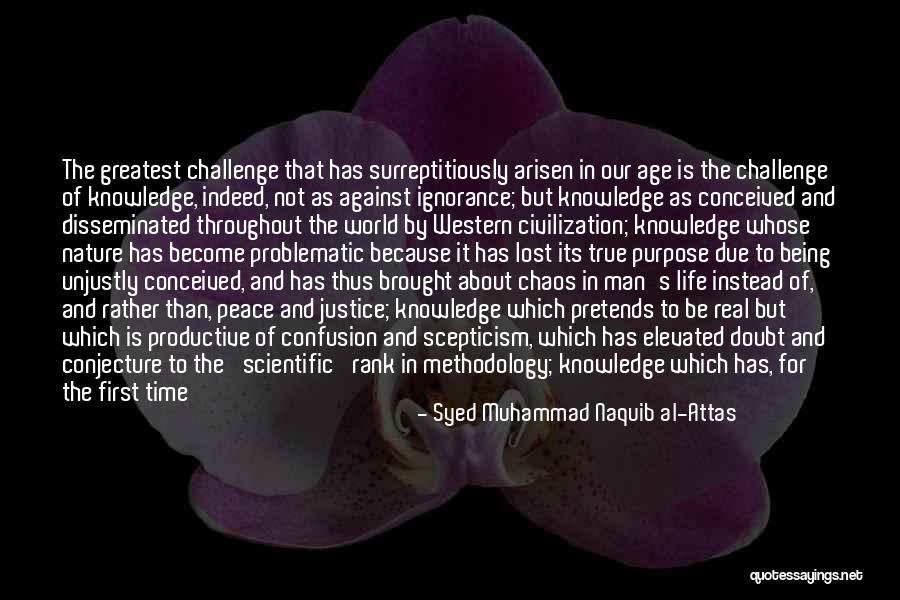
The greatest challenge that has surreptitiously arisen in our age is the challenge of knowledge, indeed, not as against ignorance; but knowledge as conceived and disseminated throughout the world by Western civilization; knowledge whose nature has become problematic because it has lost its true purpose due to being unjustly conceived, and has thus brought about chaos in man's life instead of, and rather than, peace and justice; knowledge which pretends to be real but which is productive of confusion and scepticism, which has elevated doubt and conjecture to the 'scientific' rank in methodology; knowledge which has, for the first time in history, brought chaos to the Three Kingdom of Nature; the animal, vegetal and mineral. — Syed Muhammad Naquib Al-Attas
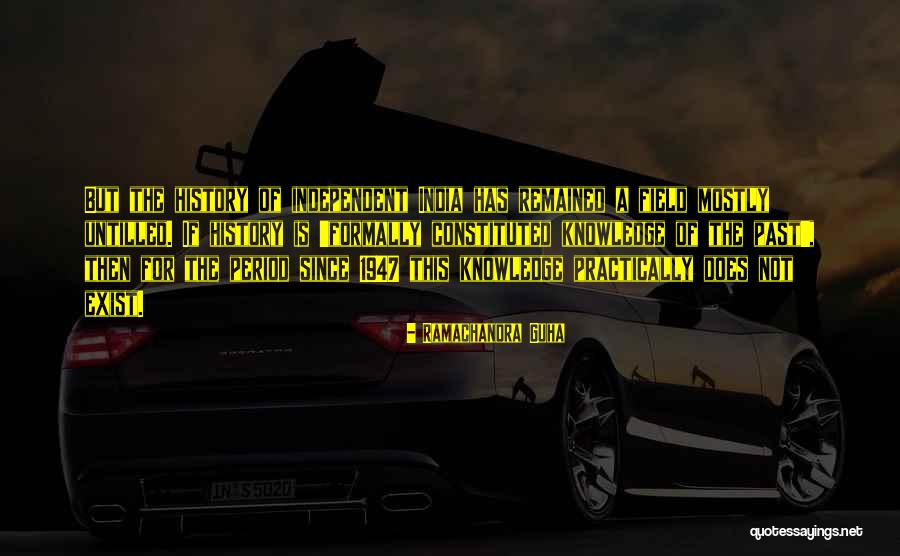
But the history of independent India has remained a field mostly untilled. If history is 'formally constituted knowledge of the past', then for the period since 1947 this knowledge practically does not exist. — Ramachandra Guha
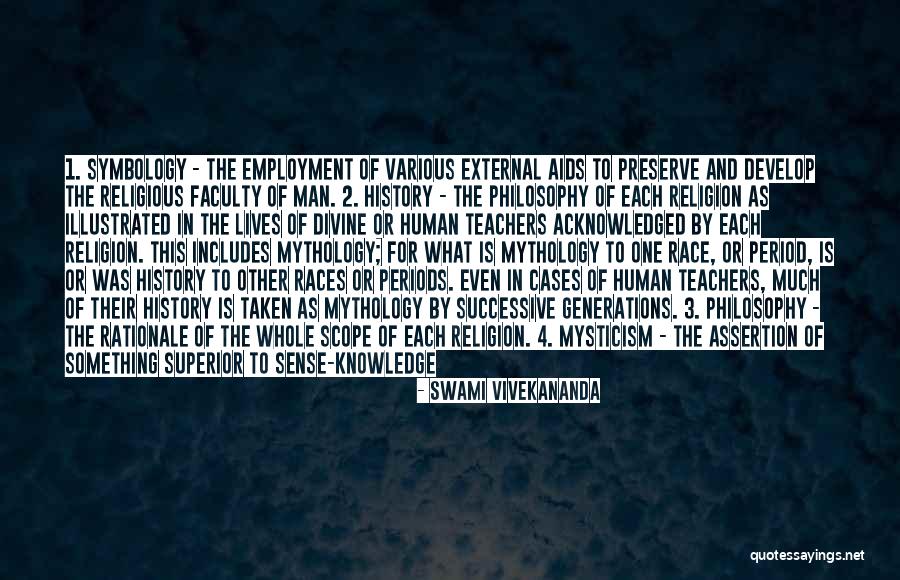
1. Symbology - The employment of various external aids to preserve and develop the religious faculty of man. 2. History - The philosophy of each religion as illustrated in the lives of divine or human teachers acknowledged by each religion. This includes mythology; for what is mythology to one race, or period, is or was history to other races or periods. Even in cases of human teachers, much of their history is taken as mythology by successive generations. 3. Philosophy - The rationale of the whole scope of each religion. 4. Mysticism - The assertion of something superior to sense-knowledge and reason which particular persons, or all persons under certain circumstances, possess; runs through the other divisions also. All — Swami Vivekananda
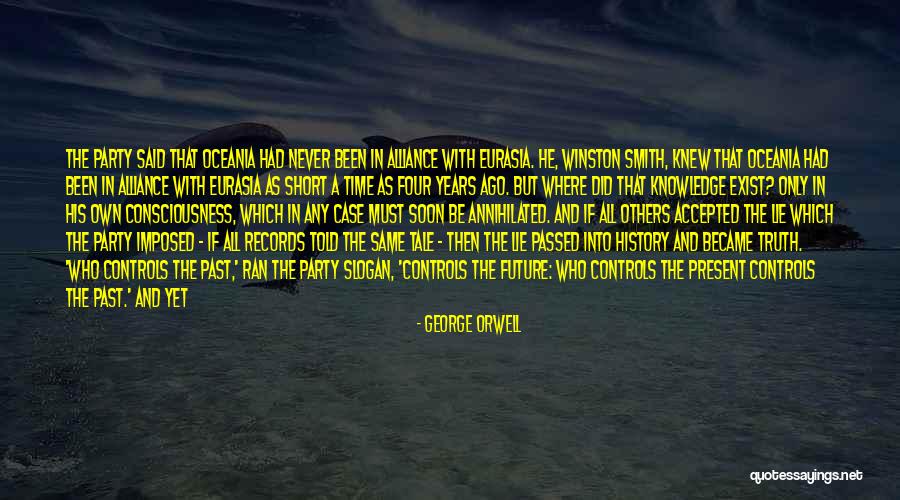
The Party said that Oceania had never been in alliance with Eurasia. He, Winston Smith, knew that Oceania had been in alliance with Eurasia as short a time as four years ago. But where did that knowledge exist? Only in his own consciousness, which in any case must soon be annihilated. And if all others accepted the lie which the Party imposed - if all records told the same tale - then the lie passed into history and became truth. 'Who controls the past,' ran the Party slogan, 'controls the future: who controls the present controls the past.' And yet the past, though of its nature alterable, never had been altered. Whatever was true now was true from everlasting to everlasting. It was quite simple. All that was needed was an unending series of victories over your own memory. 'Reality control', they called it: in Newspeak, 'doublethink'. — George Orwell
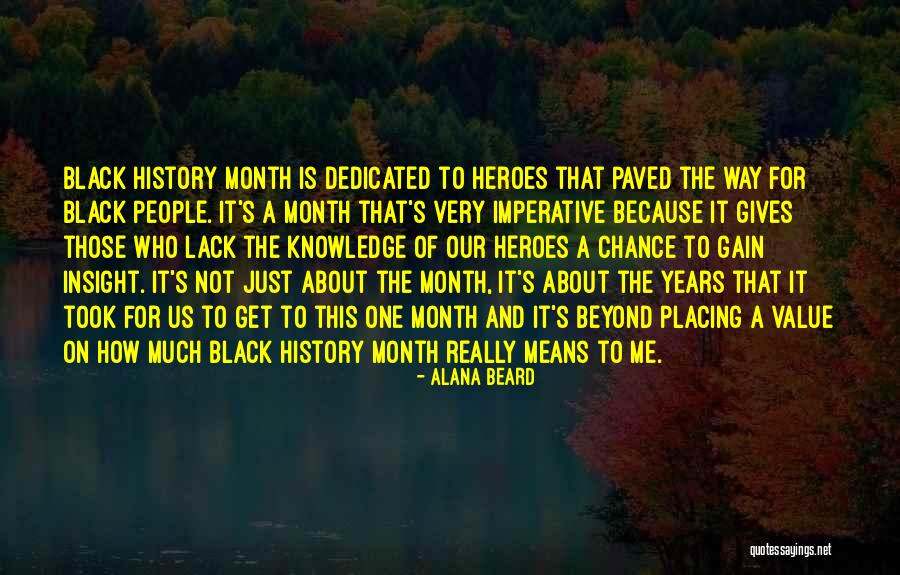
Black History Month is dedicated to heroes that paved the way for Black people. It's a month that's very imperative because it gives those who lack the knowledge of our heroes a chance to gain insight. It's not just about the month, it's about the years that it took for us to get to this one month and it's beyond placing a value on how much Black History Month really means to me. — Alana Beard
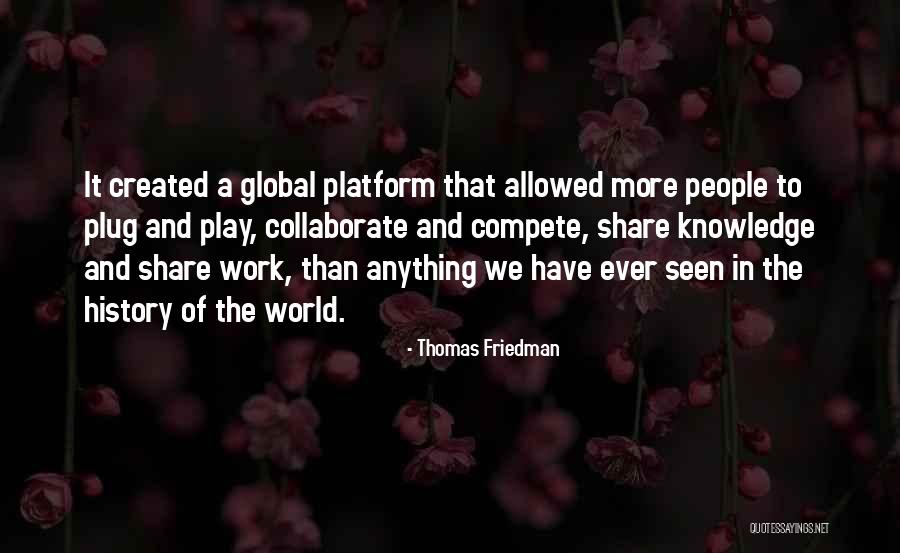
It created a global platform that allowed more people to plug and play, collaborate and compete, share knowledge and share work, than anything we have ever seen in the history of the world. — Thomas Friedman
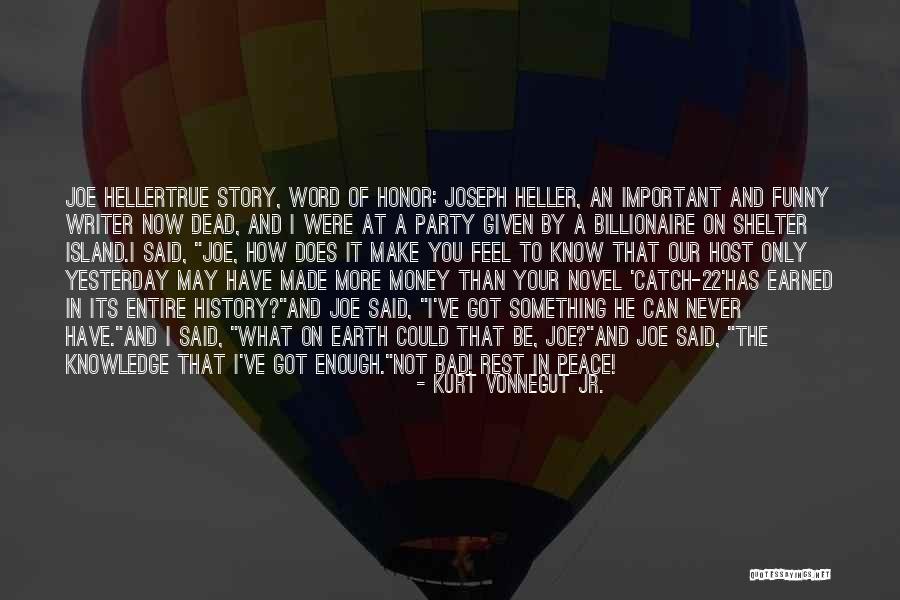
JOE HELLER
True story, Word of Honor:
Joseph Heller, an important and funny writer
now dead,
and I were at a party given by a billionaire
on Shelter Island.
I said, "Joe, how does it make you feel
to know that our host only yesterday
may have made more money
than your novel 'Catch-22'
has earned in its entire history?"
And Joe said, "I've got something he can never have."
And I said, "What on earth could that be, Joe?"
And Joe said, "The knowledge that I've got enough."
Not bad! Rest in peace! — Kurt Vonnegut Jr.
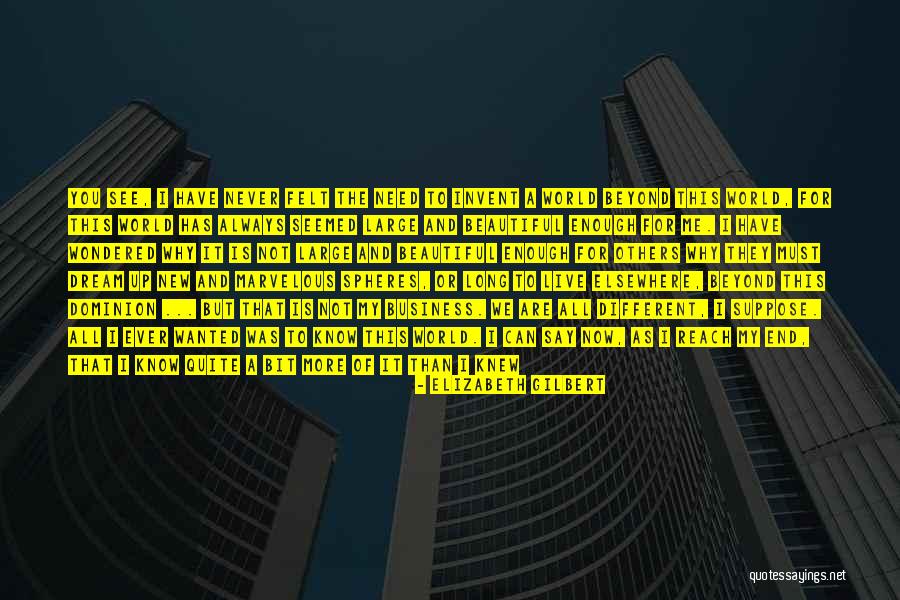
You see, I have never felt the need to invent a world beyond this world, for this world has always seemed large and beautiful enough for me. I have wondered why it is not large and beautiful enough for others
why they must dream up new and marvelous spheres, or long to live elsewhere, beyond this dominion ... but that is not my business. We are all different, I suppose. All I ever wanted was to know this world. I can say now, as I reach my end, that I know quite a bit more of it than I knew when I arrived. Moreover, my little bit of knowledge has been added to all the other accumulated knowledge of history
added to the great library, as it were. That is no small feat, sir. Anyone who can say such a thing has lived a fortunate life. — Elizabeth Gilbert
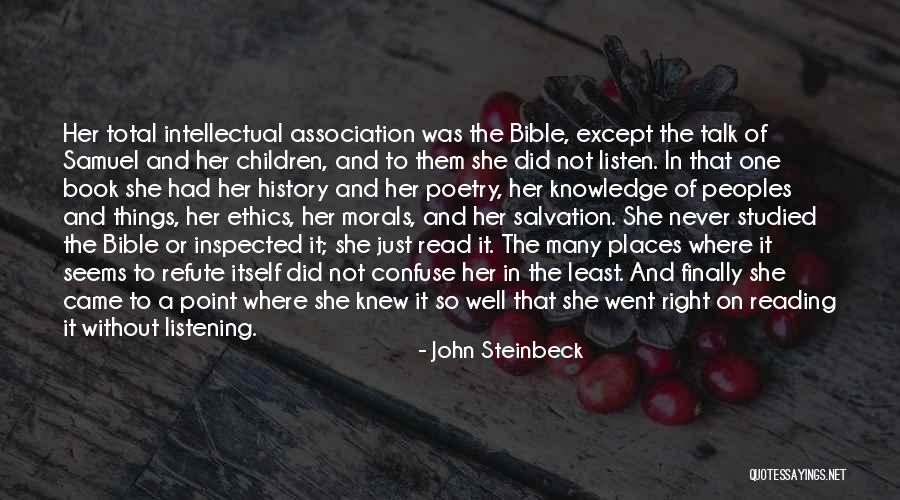
Her total intellectual association was the Bible, except the talk of Samuel and her children, and to them she did not listen. In that one book she had her history and her poetry, her knowledge of peoples and things, her ethics, her morals, and her salvation. She never studied the Bible or inspected it; she just read it. The many places where it seems to refute itself did not confuse her in the least. And finally she came to a point where she knew it so well that she went right on reading it without listening. — John Steinbeck
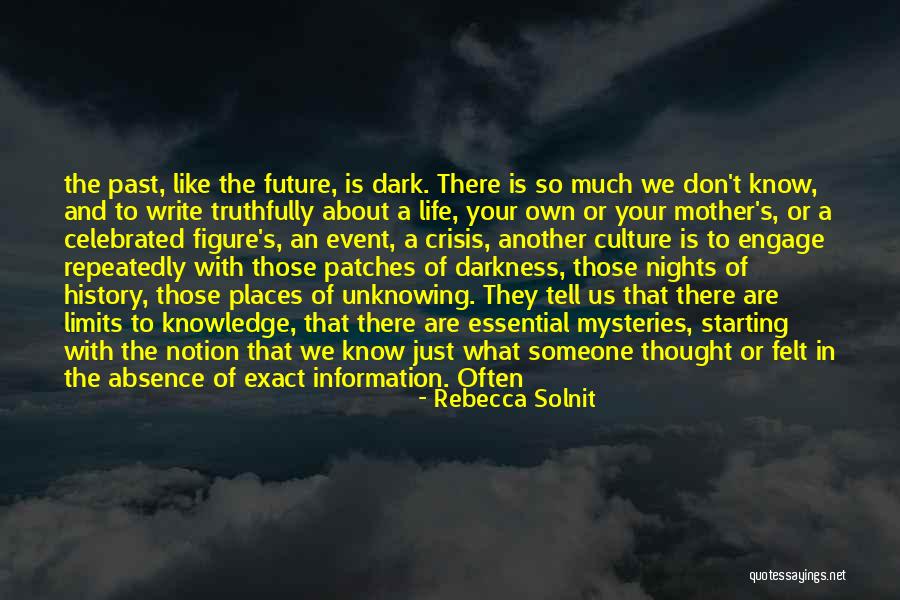
the past, like the future, is dark. There is so much we don't know, and to write truthfully about a life, your own or your mother's, or a celebrated figure's, an event, a crisis, another culture is to engage repeatedly with those patches of darkness, those nights of history, those places of unknowing. They tell us that there are limits to knowledge, that there are essential mysteries, starting with the notion that we know just what someone thought or felt in the absence of exact information. Often — Rebecca Solnit
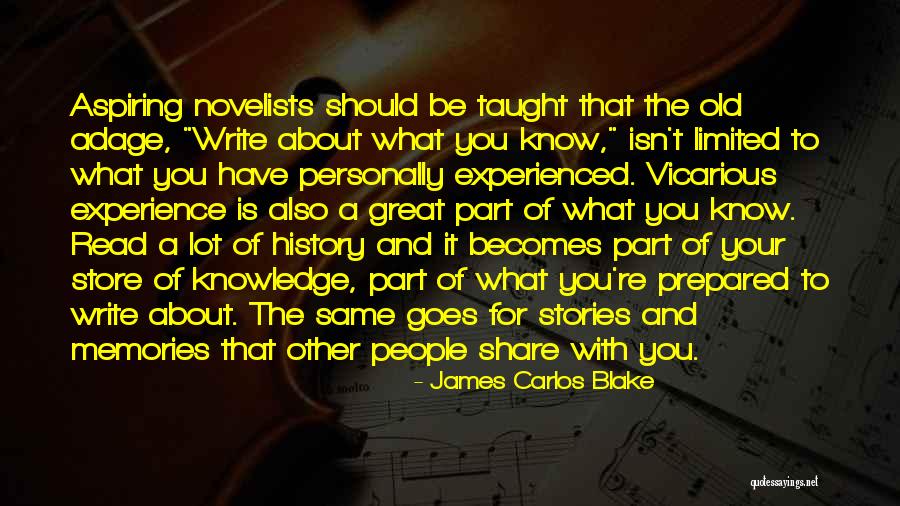
Aspiring novelists should be taught that the old adage, "Write about what you know," isn't limited to what you have personally experienced. Vicarious experience is also a great part of what you know. Read a lot of history and it becomes part of your store of knowledge, part of what you're prepared to write about. The same goes for stories and memories that other people share with you. — James Carlos Blake
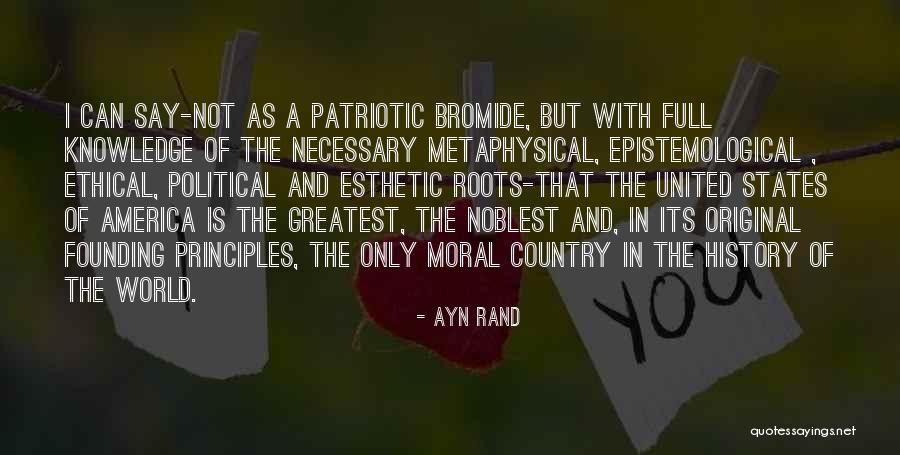
I can say-not as a patriotic bromide, but with full knowledge of the necessary metaphysical, epistemological , ethical, political and esthetic roots-that the United States of America is the greatest, the noblest and, in its original founding principles, the only moral country in the history of the world. — Ayn Rand
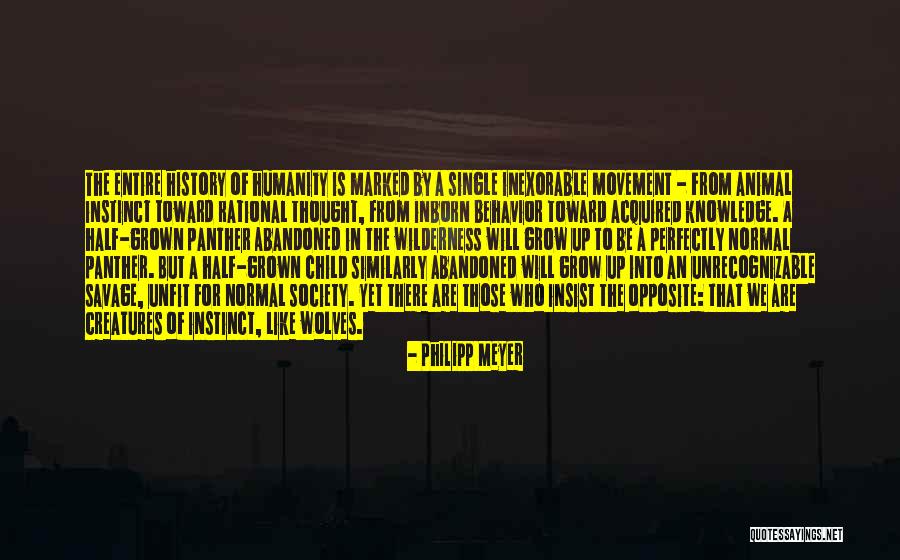
The entire history of humanity is marked by a single inexorable movement - from animal instinct toward rational thought, from inborn behavior toward acquired knowledge. A half-grown panther abandoned in the wilderness will grow up to be a perfectly normal panther. But a half-grown child similarly abandoned will grow up into an unrecognizable savage, unfit for normal society. Yet there are those who insist the opposite: that we are creatures of instinct, like wolves. — Philipp Meyer
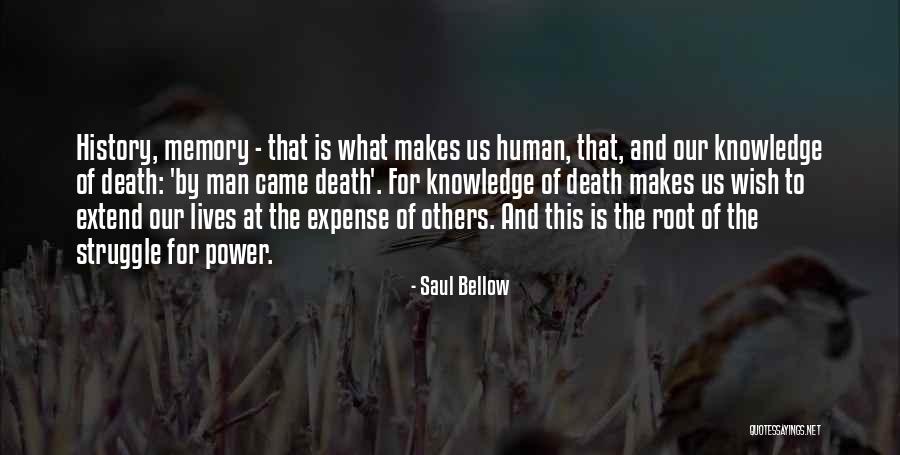
History, memory - that is what makes us human, that, and our knowledge of death: 'by man came death'. For knowledge of death makes us wish to extend our lives at the expense of others. And this is the root of the struggle for power. — Saul Bellow
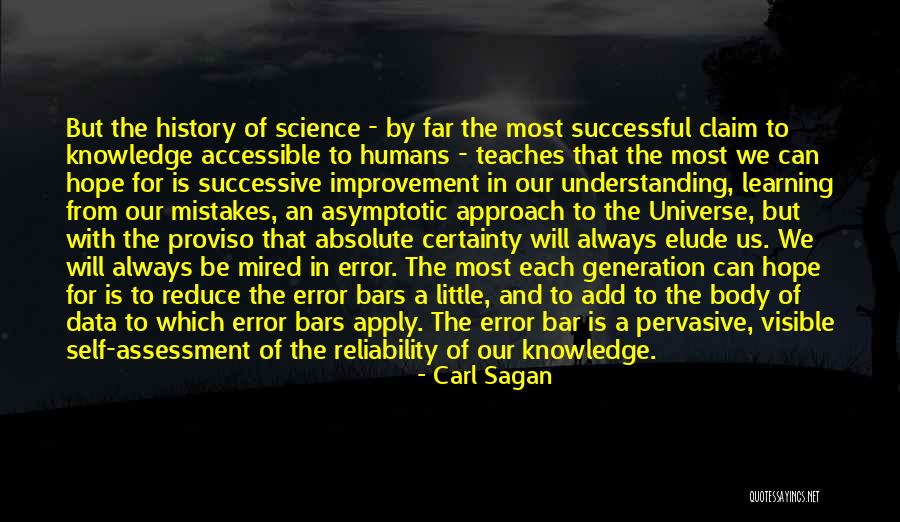
But the history of science - by far the most successful claim to knowledge accessible to humans - teaches that the most we can hope for is successive improvement in our understanding, learning from our mistakes, an asymptotic approach to the Universe, but with the proviso that absolute certainty will always elude us. We will always be mired in error. The most each generation can hope for is to reduce the error bars a little, and to add to the body of data to which error bars apply. The error bar is a pervasive, visible self-assessment of the reliability of our knowledge. — Carl Sagan
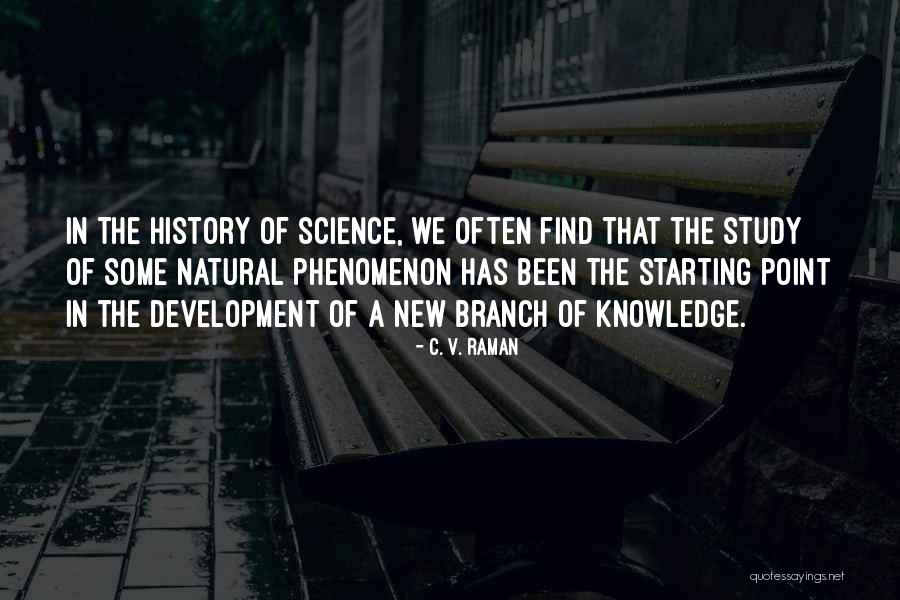
In the history of science, we often find that the study of some natural phenomenon has been the starting point in the development of a new branch of knowledge. — C. V. Raman
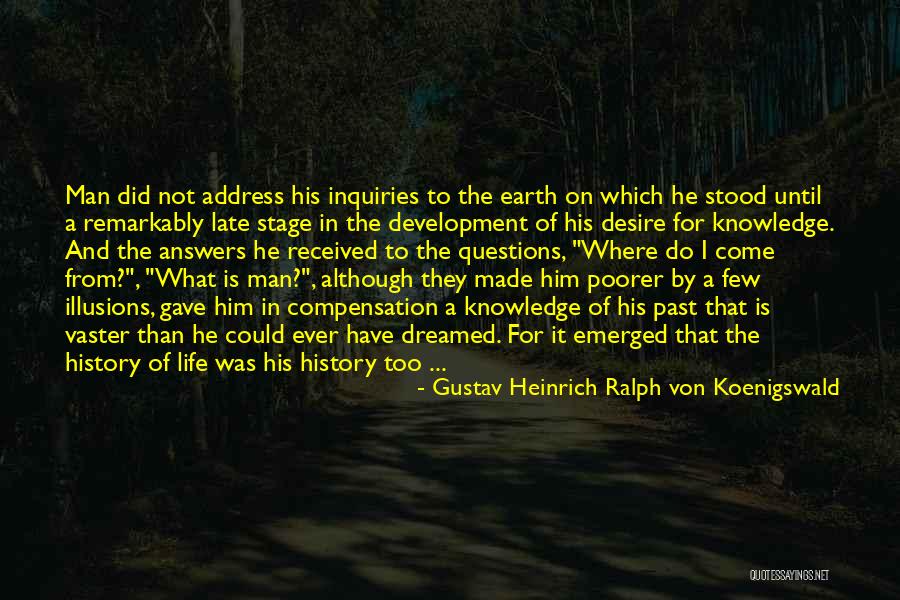
Man did not address his inquiries to the earth on which he stood until a remarkably late stage in the development of his desire for knowledge. And the answers he received to the questions, "Where do I come from?", "What is man?", although they made him poorer by a few illusions, gave him in compensation a knowledge of his past that is vaster than he could ever have dreamed. For it emerged that the history of life was his history too ... — Gustav Heinrich Ralph Von Koenigswald
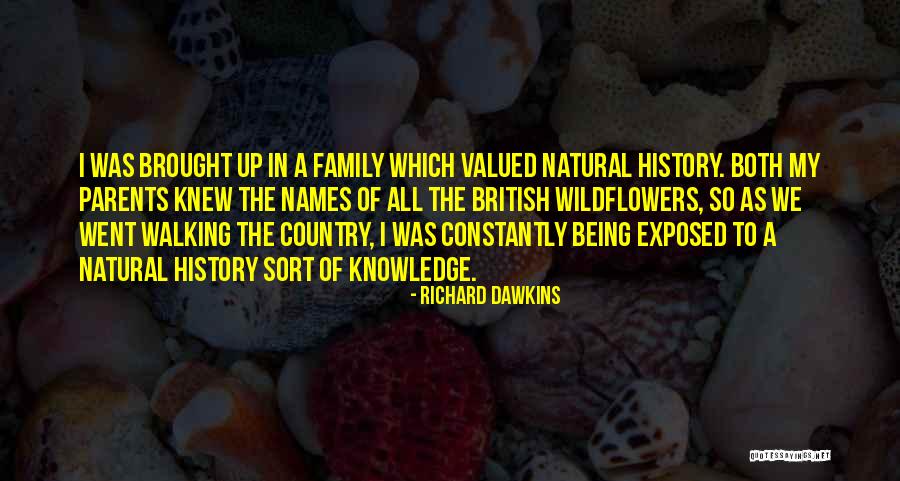
I was brought up in a family which valued natural history. Both my parents knew the names of all the British wildflowers, so as we went walking the country, I was constantly being exposed to a natural history sort of knowledge. — Richard Dawkins
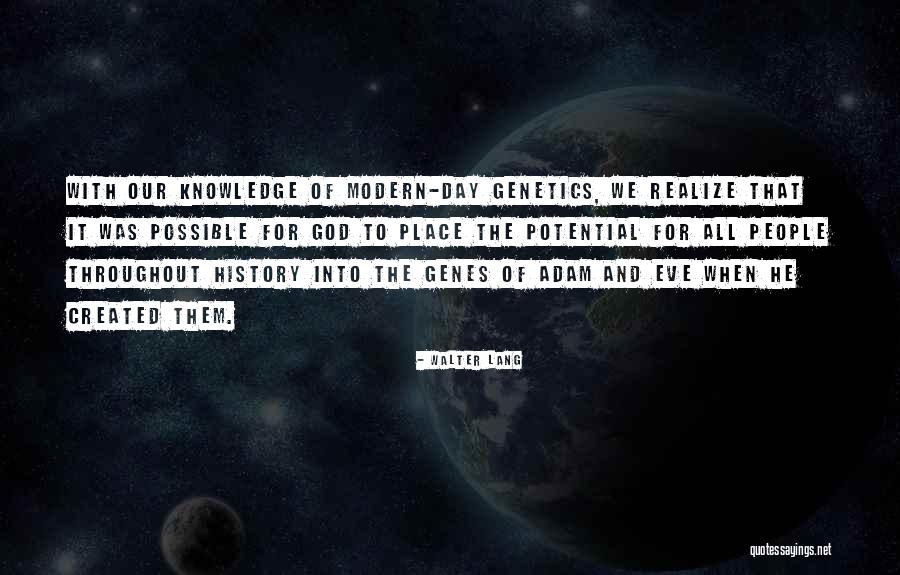
With our knowledge of modern-day genetics, we realize that it was possible for God to place the potential for all people throughout history into the genes of Adam and Eve when He created them. — Walter Lang
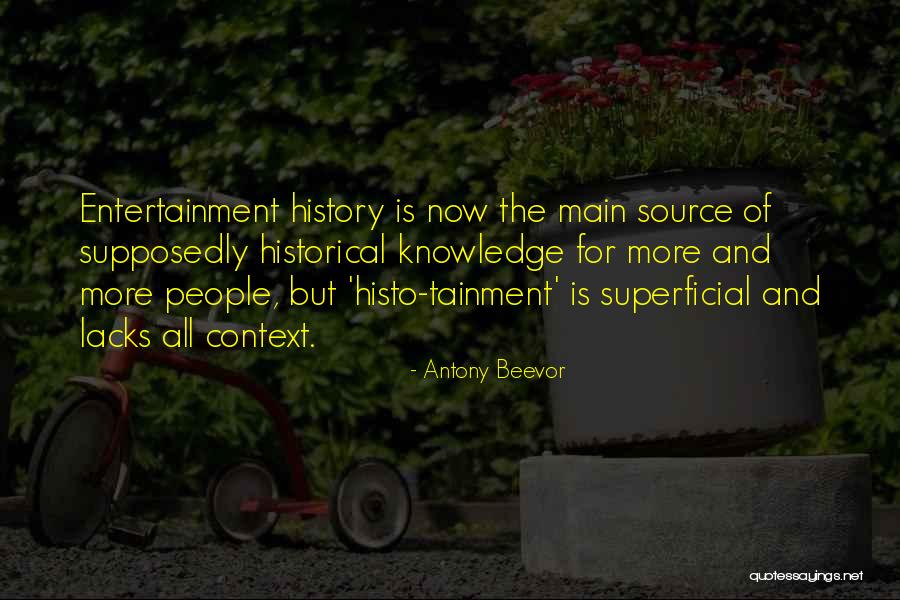
Entertainment history is now the main source of supposedly historical knowledge for more and more people, but 'histo-tainment' is superficial and lacks all context. — Antony Beevor
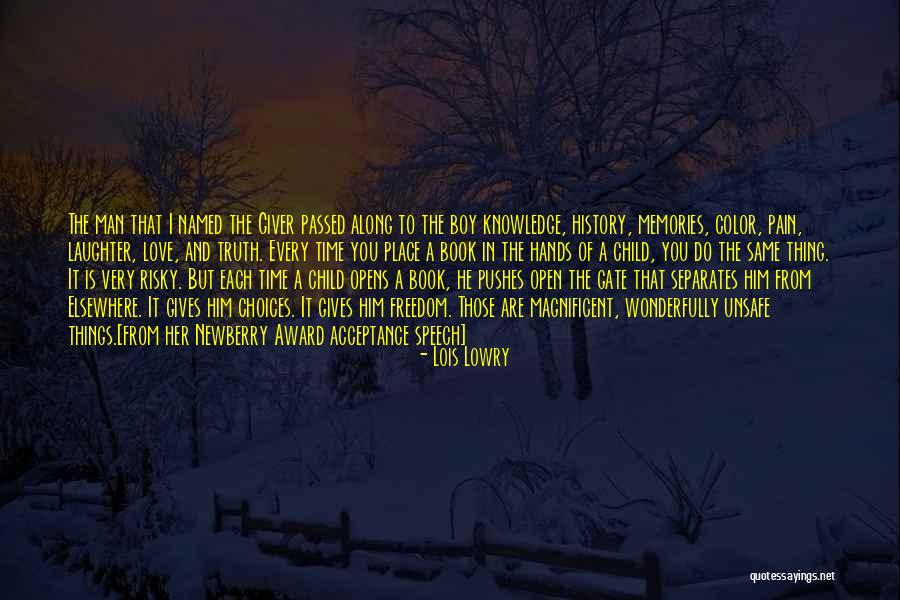
The man that I named the Giver passed along to the boy knowledge, history, memories, color, pain, laughter, love, and truth. Every time you place a book in the hands of a child, you do the same thing. It is very risky. But each time a child opens a book, he pushes open the gate that separates him from Elsewhere. It gives him choices. It gives him freedom. Those are magnificent, wonderfully unsafe things.
[from her Newberry Award acceptance speech] — Lois Lowry
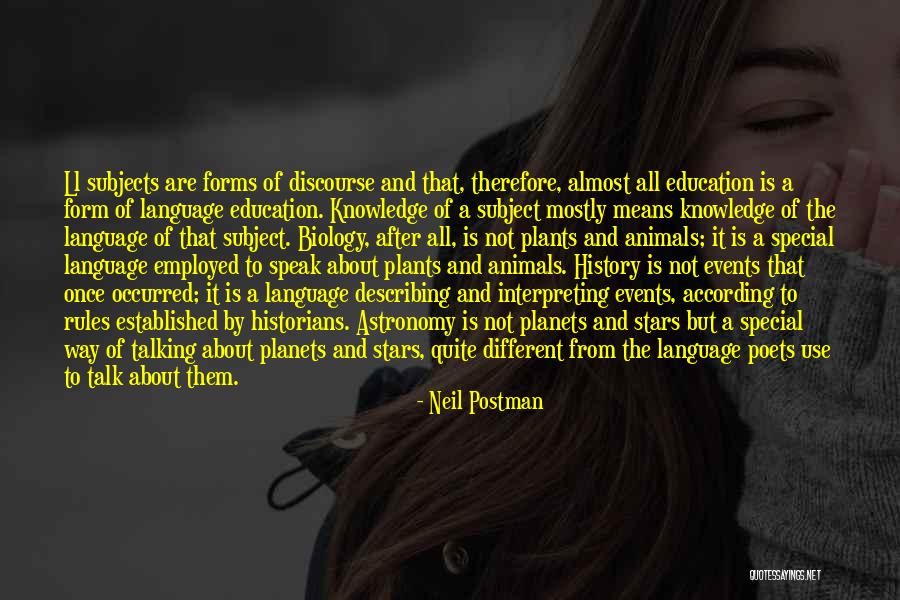
Ll subjects are forms of discourse and that, therefore, almost all education is a form of language education. Knowledge of a subject mostly means knowledge of the language of that subject. Biology, after all, is not plants and animals; it is a special language employed to speak about plants and animals. History is not events that once occurred; it is a language describing and interpreting events, according to rules established by historians. Astronomy is not planets and stars but a special way of talking about planets and stars, quite different from the language poets use to talk about them. — Neil Postman
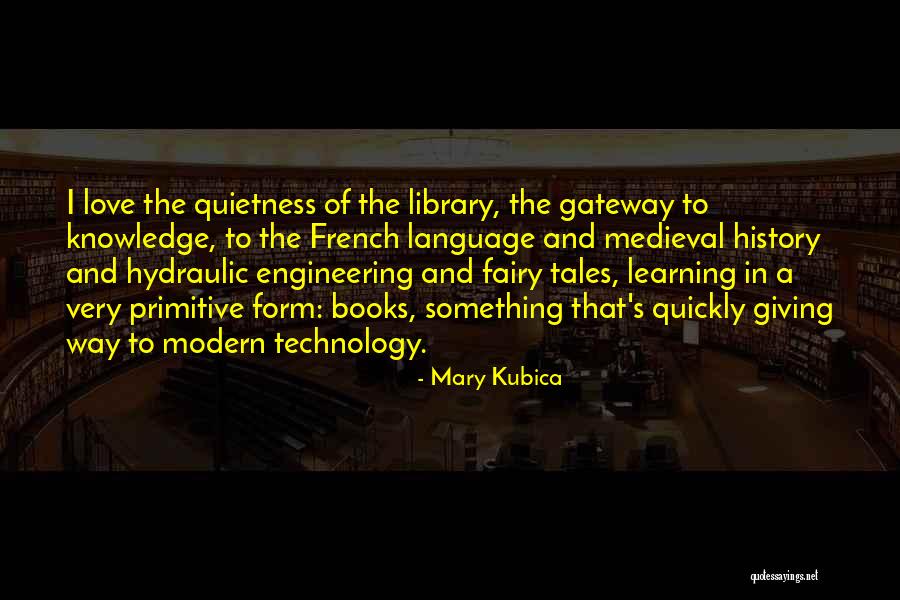
I love the quietness of the library, the gateway to knowledge, to the French language and medieval history and hydraulic engineering and fairy tales, learning in a very primitive form: books, something that's quickly giving way to modern technology. — Mary Kubica
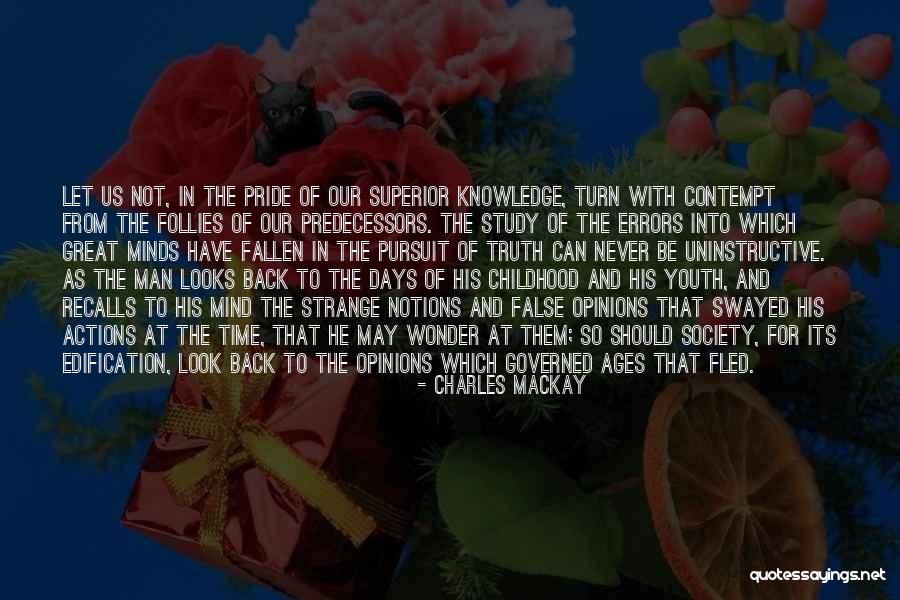
Let us not, in the pride of our superior knowledge, turn with contempt from the follies of our predecessors. The study of the errors into which great minds have fallen in the pursuit of truth can never be uninstructive. As the man looks back to the days of his childhood and his youth, and recalls to his mind the strange notions and false opinions that swayed his actions at the time, that he may wonder at them; so should society, for its edification, look back to the opinions which governed ages that fled. — Charles Mackay
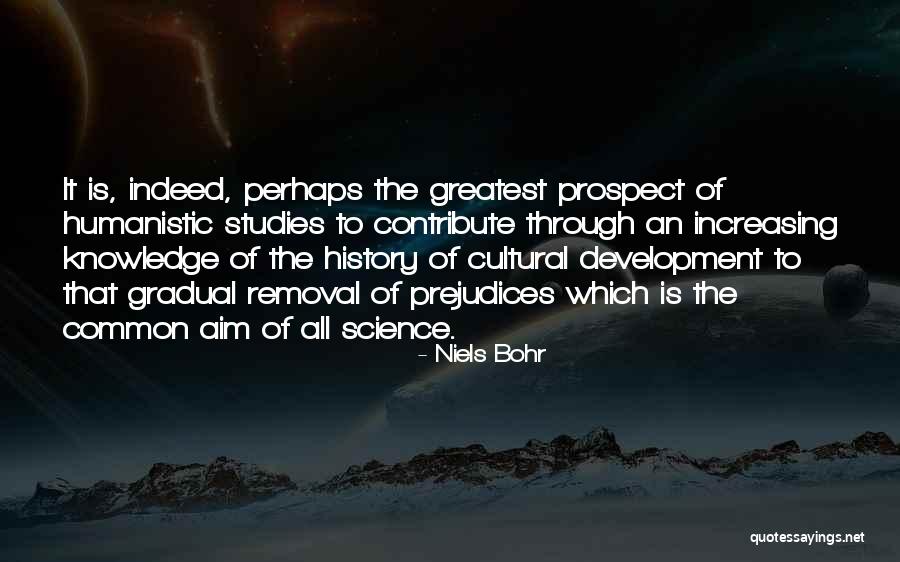
It is, indeed, perhaps the greatest prospect of humanistic studies to contribute through an increasing knowledge of the history of cultural development to that gradual removal of prejudices which is the common aim of all science. — Niels Bohr
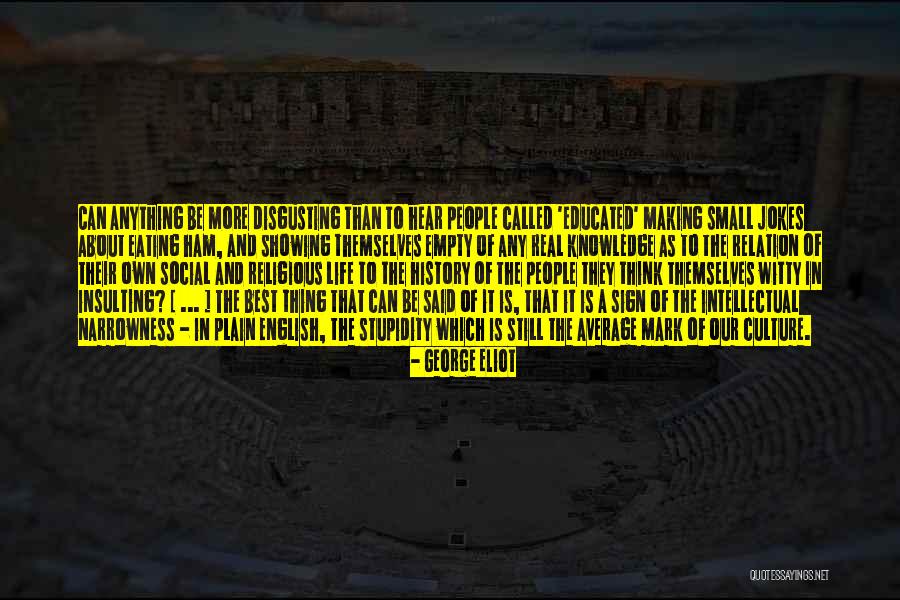
Can anything be more disgusting than to hear people called 'educated' making small jokes about eating ham, and showing themselves empty of any real knowledge as to the relation of their own social and religious life to the history of the people they think themselves witty in insulting? [ ... ] The best thing that can be said of it is, that it is a sign of the intellectual narrowness - in plain English, the stupidity which is still the average mark of our culture. — George Eliot
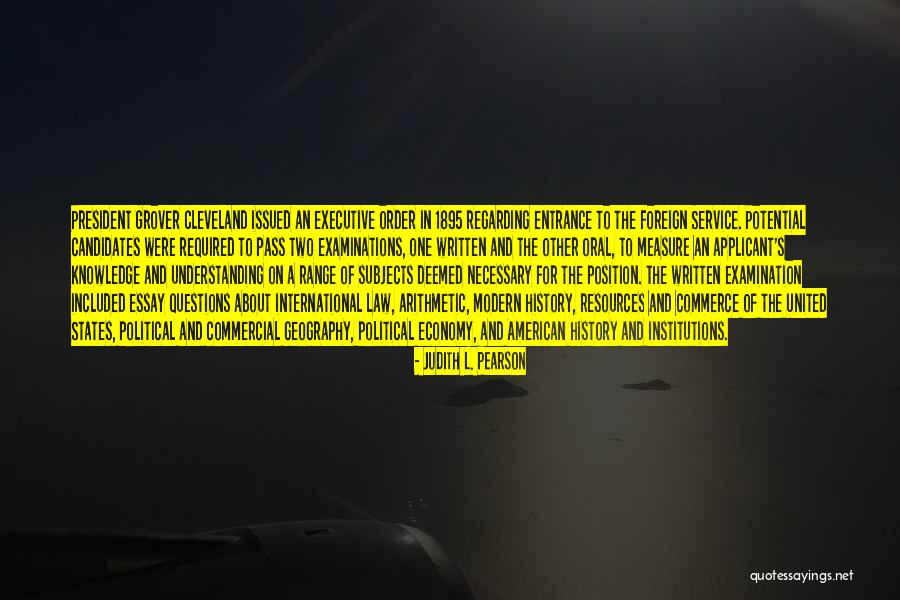
President Grover Cleveland issued an executive order in 1895 regarding entrance to the Foreign Service. Potential candidates were required to pass two examinations, one written and the other oral, to measure an applicant's knowledge and understanding on a range of subjects deemed necessary for the position. The written examination included essay questions about international law, arithmetic, modern history, resources and commerce of the United States, political and commercial geography, political economy, and American history and institutions. — Judith L. Pearson
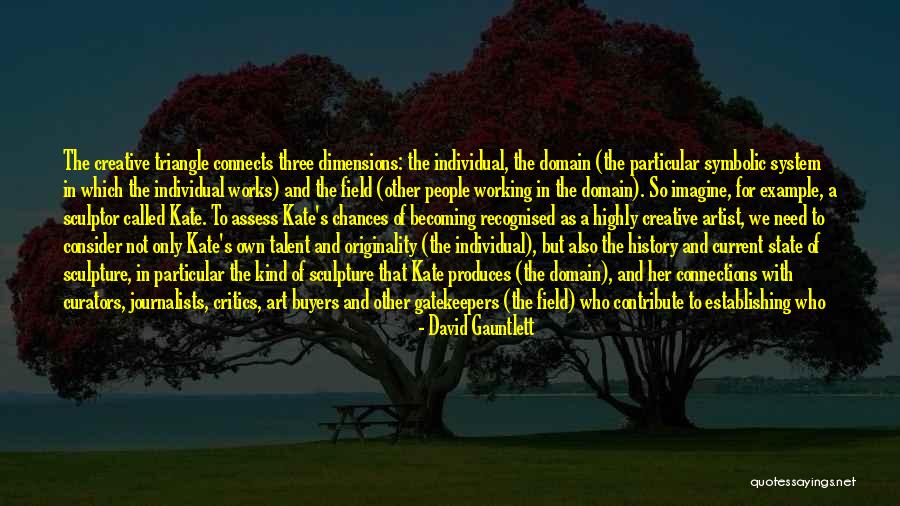
The creative triangle connects three dimensions: the individual, the domain (the particular symbolic system in which the individual works) and the field (other people working in the domain). So imagine, for example, a sculptor called Kate. To assess Kate's chances of becoming recognised as a highly creative artist, we need to consider not only Kate's own talent and originality (the individual), but also the history and current state of sculpture, in particular the kind of sculpture that Kate produces (the domain), and her connections with curators, journalists, critics, art buyers and other gatekeepers (the field) who contribute to establishing who becomes recognised and celebrated. Without a knowledge of the domain, and connection with the field, Kate is unlikely to make an impact. — David Gauntlett
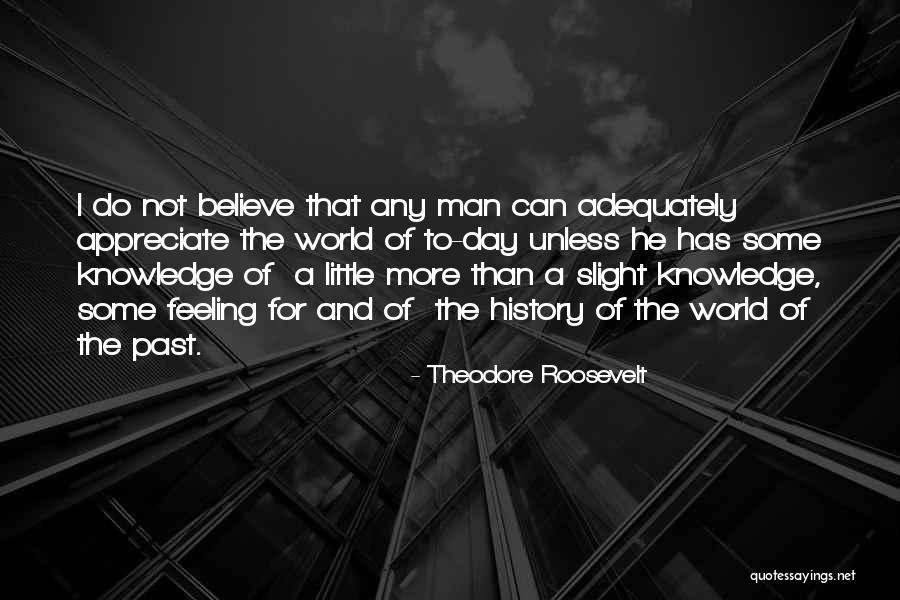
I do not believe that any man can adequately appreciate the world of to-day unless he has some knowledge of
a little more than a slight knowledge, some feeling for and of
the history of the world of the past. — Theodore Roosevelt
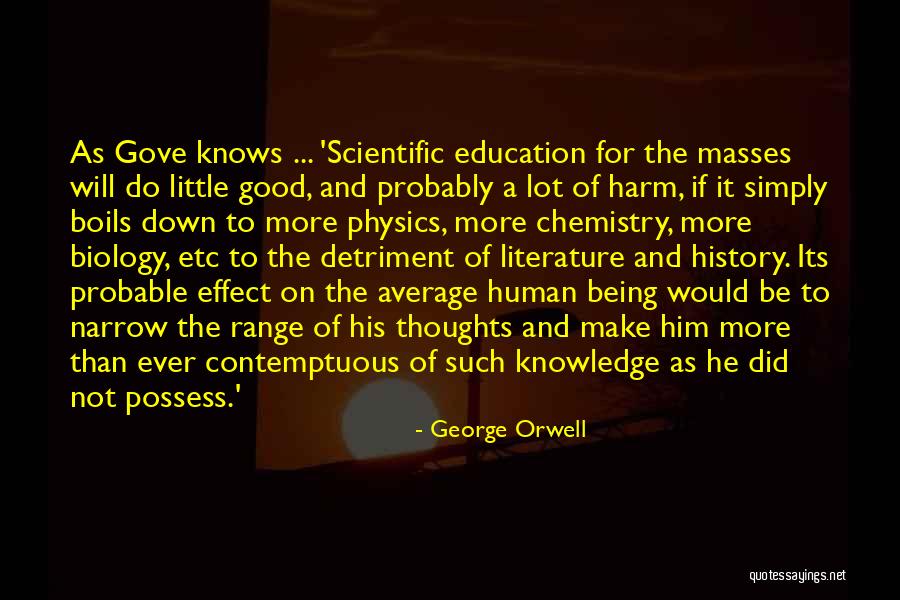
As Gove knows ... 'Scientific education for the masses will do little good, and probably a lot of harm, if it simply boils down to more physics, more chemistry, more biology, etc to the detriment of literature and history. Its probable effect on the average human being would be to narrow the range of his thoughts and make him more than ever contemptuous of such knowledge as he did not possess.' — George Orwell
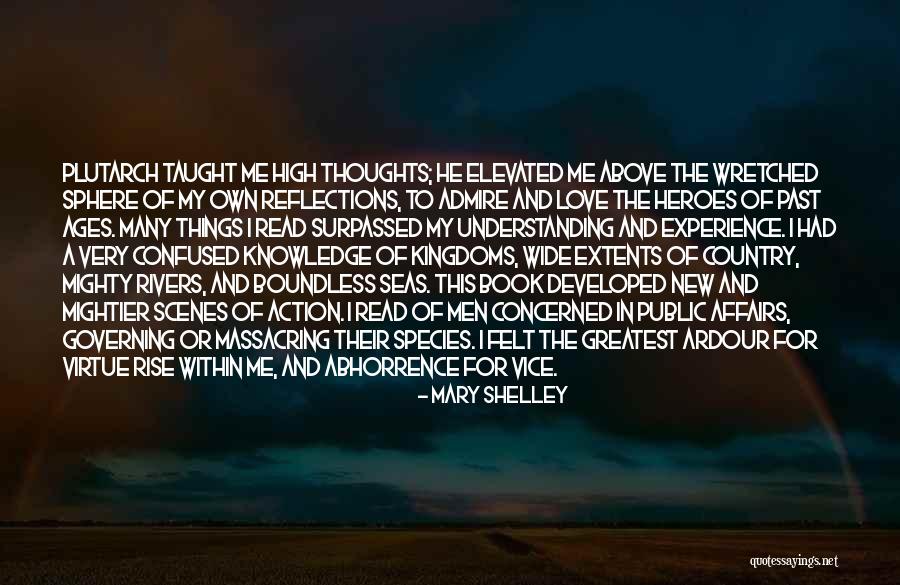
Plutarch taught me high thoughts; he elevated me above the wretched sphere of my own reflections, to admire and love the heroes of past ages. Many things I read surpassed my understanding and experience. I had a very confused knowledge of kingdoms, wide extents of country, mighty rivers, and boundless seas. This book developed new and mightier scenes of action. I read of men concerned in public affairs, governing or massacring their species. I felt the greatest ardour for virtue rise within me, and abhorrence for vice. — Mary Shelley
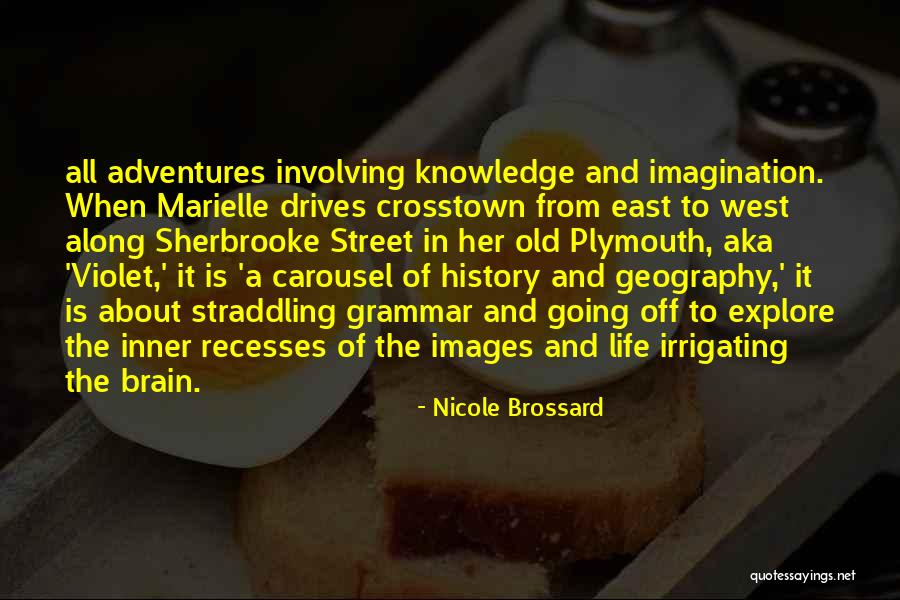
all adventures involving knowledge and imagination. When Marielle drives crosstown from east to west along Sherbrooke Street in her old Plymouth, aka 'Violet,' it is 'a carousel of history and geography,' it is about straddling grammar and going off to explore the inner recesses of the images and life irrigating the brain. — Nicole Brossard
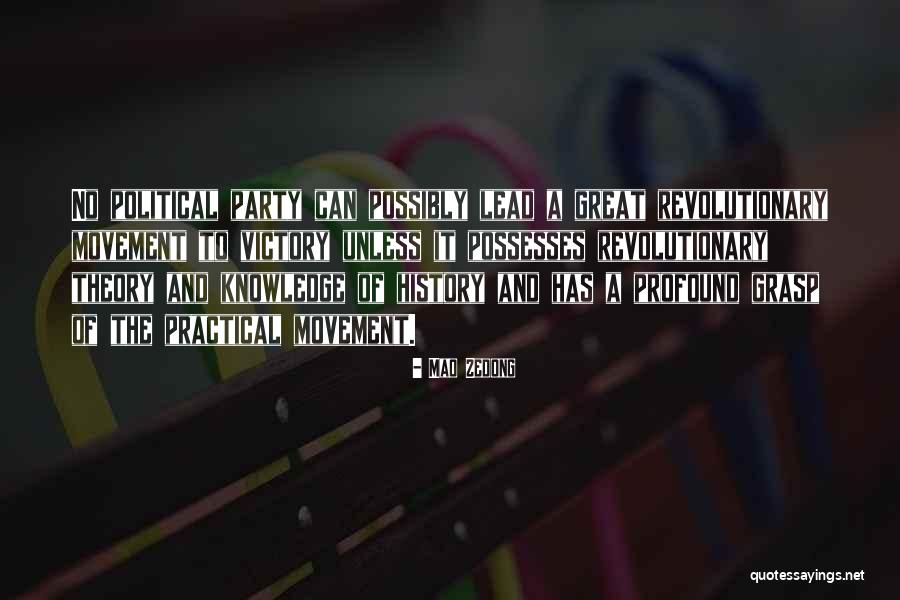
No political party can possibly lead a great revolutionary movement to victory unless it possesses revolutionary theory and knowledge of history and has a profound grasp of the practical movement. — Mao Zedong
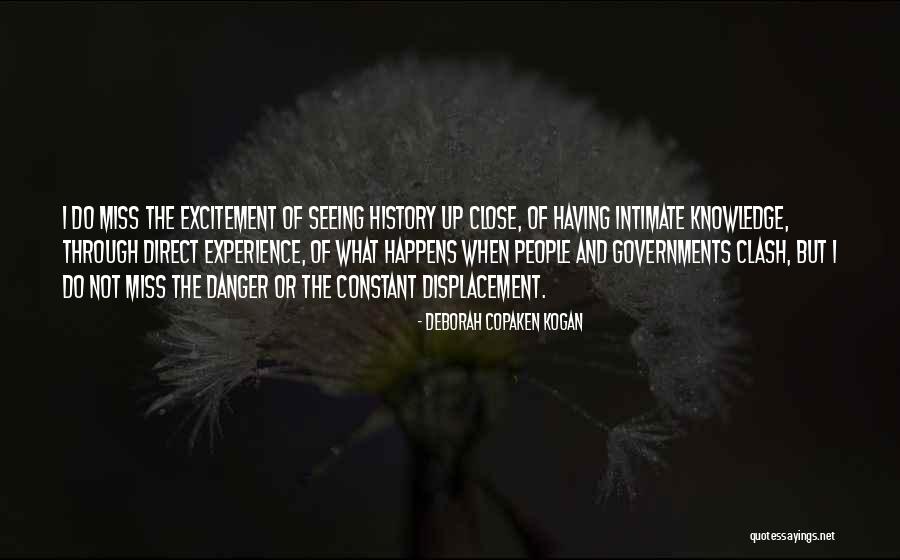
I do miss the excitement of seeing history up close, of having intimate knowledge, through direct experience, of what happens when people and governments clash, but I do not miss the danger or the constant displacement. — Deborah Copaken Kogan
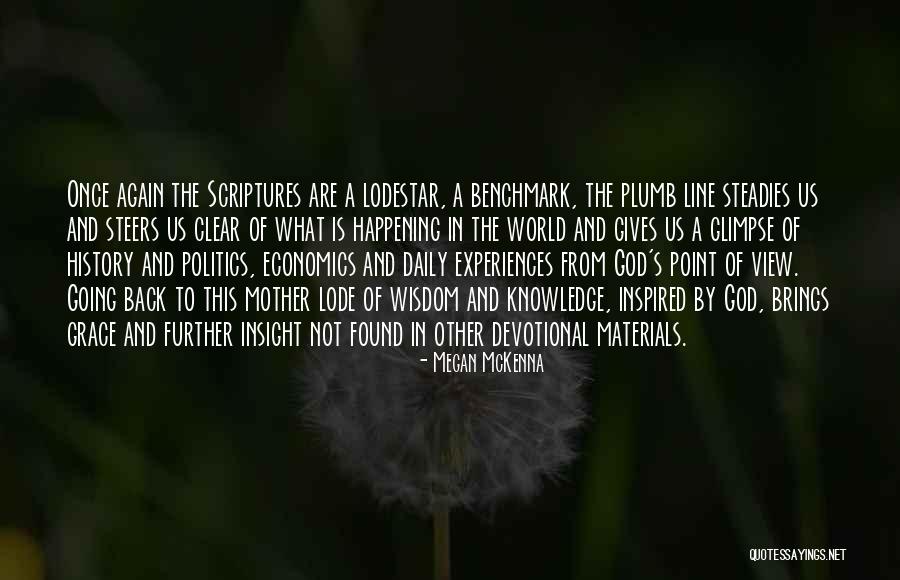
Once again the Scriptures are a lodestar, a benchmark, the plumb line steadies us and steers us clear of what is happening in the world and gives us a glimpse of history and politics, economics and daily experiences from God's point of view. Going back to this mother lode of wisdom and knowledge, inspired by God, brings grace and further insight not found in other devotional materials. — Megan McKenna
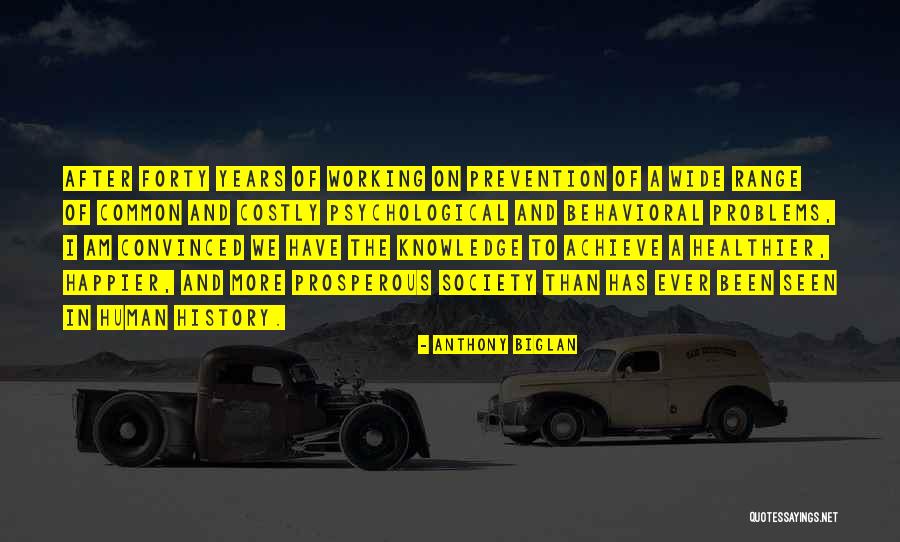
After forty years of working on prevention of a wide range of common and costly psychological and behavioral problems, I am convinced we have the knowledge to achieve a healthier, happier, and more prosperous society than has ever been seen in human history. — Anthony Biglan
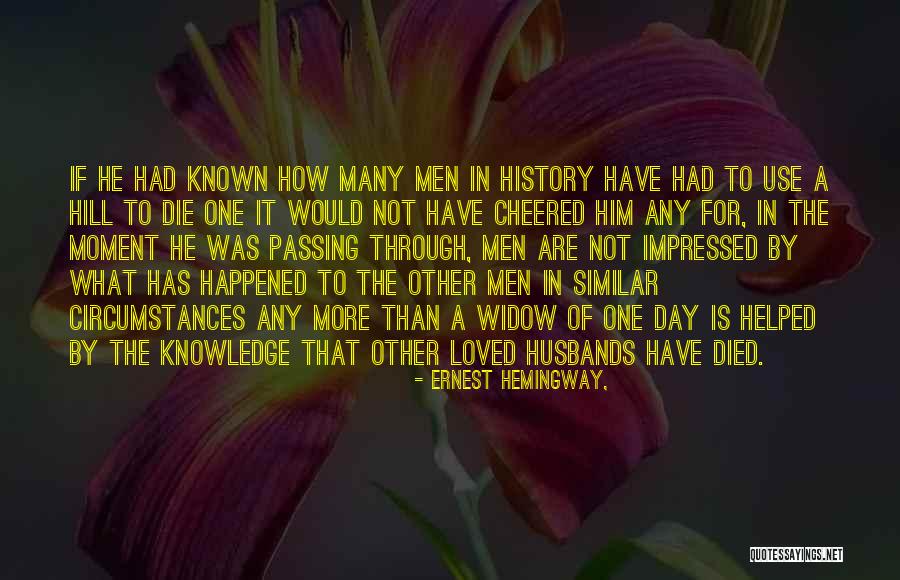
If he had known how many men in history have had to use a hill to die one it would not have cheered him any for, in the moment he was passing through, men are not impressed by what has happened to the other men in similar circumstances any more than a widow of one day is helped by the knowledge that other loved husbands have died. — Ernest Hemingway,
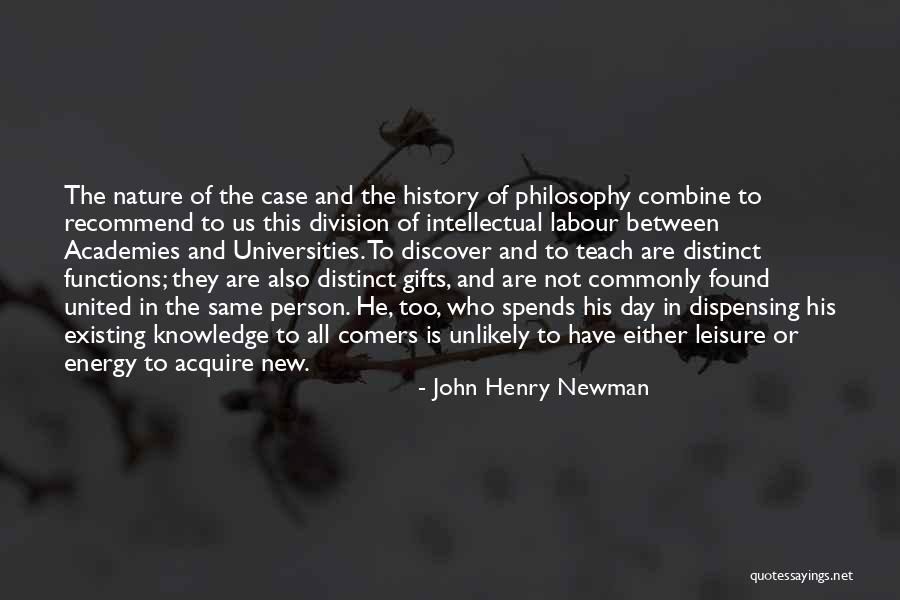
The nature of the case and the history of philosophy combine to recommend to us this division of intellectual labour between Academies and Universities. To discover and to teach are distinct functions; they are also distinct gifts, and are not commonly found united in the same person. He, too, who spends his day in dispensing his existing knowledge to all comers is unlikely to have either leisure or energy to acquire new. — John Henry Newman
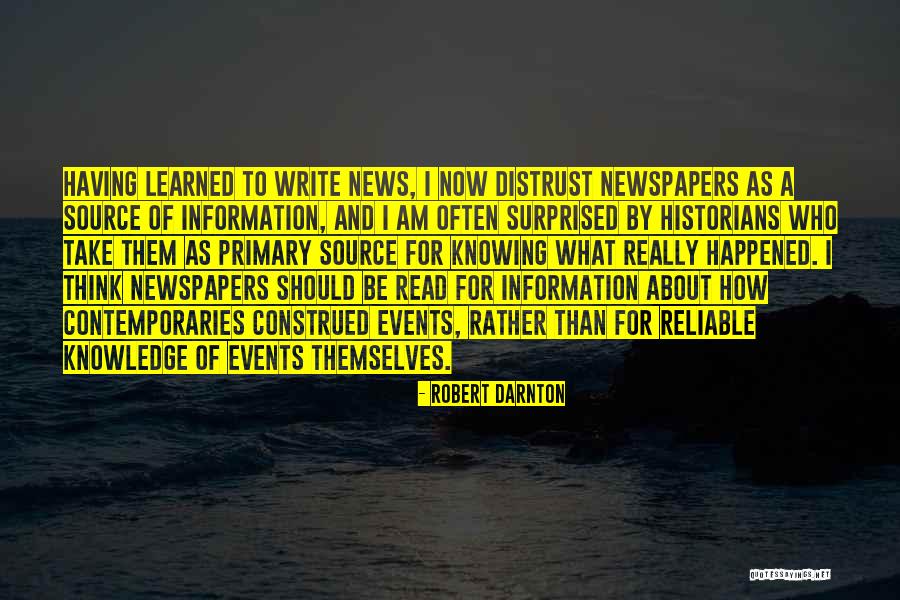
Having learned to write news, I now distrust newspapers as a source of information, and I am often surprised by historians who take them as primary source for knowing what really happened. I think newspapers should be read for information about how contemporaries construed events, rather than for reliable knowledge of events themselves. — Robert Darnton
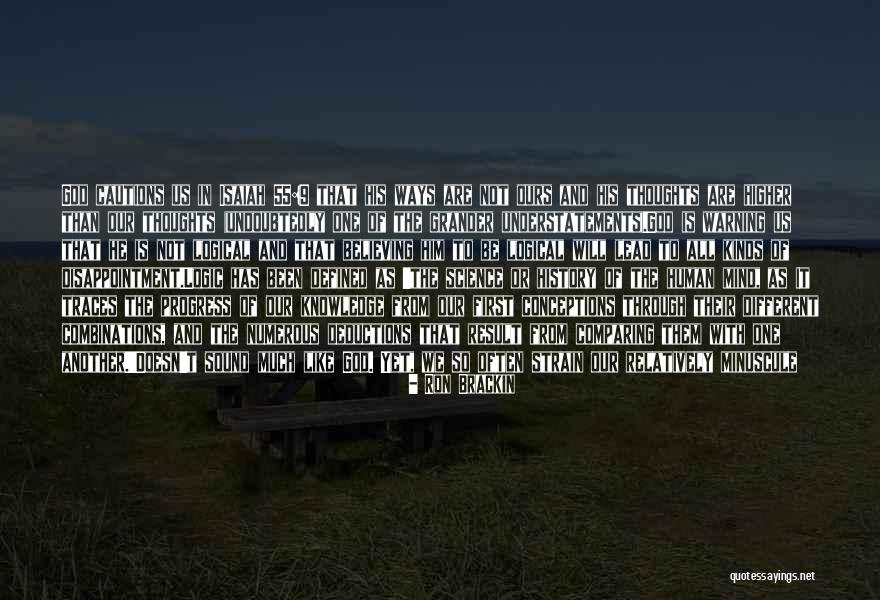
God cautions us in Isaiah 55:9 that his ways are not ours and his thoughts are higher than our thoughts (undoubtedly one of the grander understatements).
God is warning us that he is not logical and that believing him to be logical will lead to all kinds of disappointment.
Logic has been defined as 'the science or history of the human mind, as it traces the progress of our knowledge from our first conceptions through their different combinations, and the numerous deductions that result from comparing them with one another.'
Doesn't sound much like God. Yet, we so often strain our relatively minuscule brains to conceive, combine, compare, and deduce. Then we fault God when his conclusions disagree.
The repetition of this useless exercise leads to a form of insanity which ultimately manifests in denial of the existence of such an illogical God. — Ron Brackin
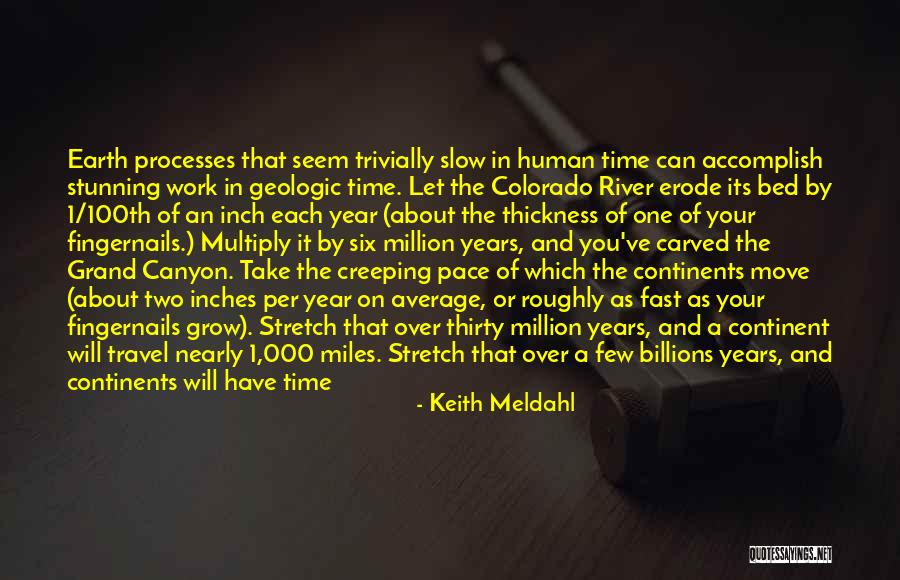
Earth processes that seem trivially slow in human time can accomplish stunning work in geologic time. Let the Colorado River erode its bed by 1/100th of an inch each year (about the thickness of one of your fingernails.) Multiply it by six million years, and you've carved the Grand Canyon. Take the creeping pace of which the continents move (about two inches per year on average, or roughly as fast as your fingernails grow). Stretch that over thirty million years, and a continent will travel nearly 1,000 miles. Stretch that over a few billions years, and continents will have time to wander from the tropics to the poles and back, crunching together to assemble super-continents, break apart into new configurations- and do all of that again several times over. Deep time, it could be said, is Nature's way of giving the Earth room for its history. The recognition of deep time might be geology's paramount contribution to human knowledge. — Keith Meldahl
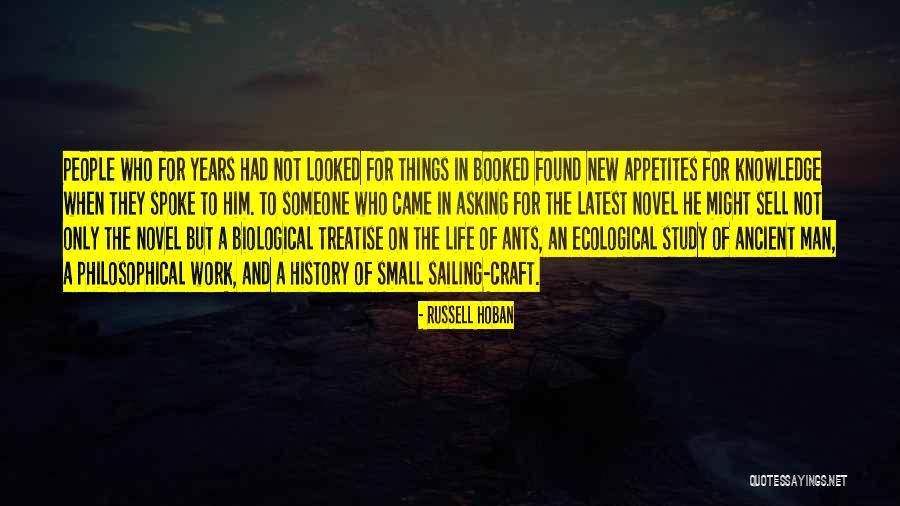
People who for years had not looked for things in booked found new appetites for knowledge when they spoke to him. To someone who came in asking for the latest novel he might sell not only the novel but a biological treatise on the life of ants, an ecological study of ancient man, a philosophical work, and a history of small sailing-craft. — Russell Hoban
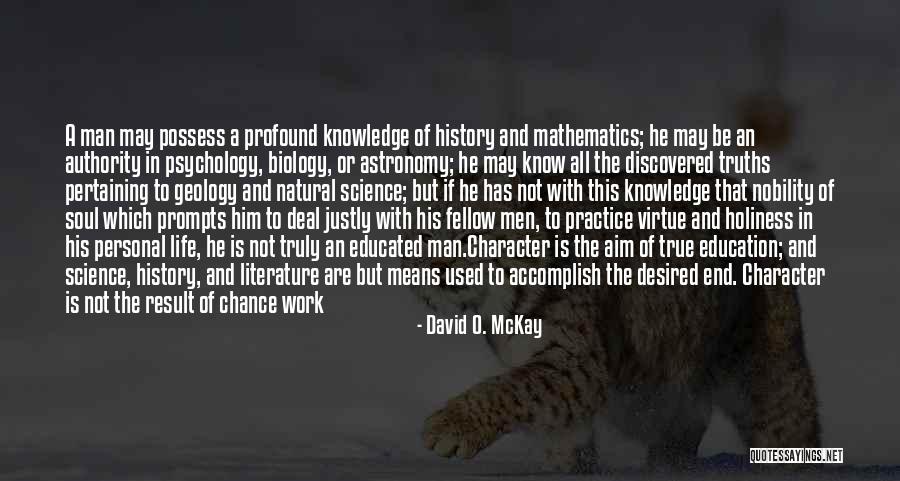
A man may possess a profound knowledge of history and mathematics; he may be an authority in psychology, biology, or astronomy; he may know all the discovered truths pertaining to geology and natural science; but if he has not with this knowledge that nobility of soul which prompts him to deal justly with his fellow men, to practice virtue and holiness in his personal life, he is not truly an educated man.
Character is the aim of true education; and science, history, and literature are but means used to accomplish the desired end. Character is not the result of chance work but of continuous right thinking and right acting. — David O. McKay
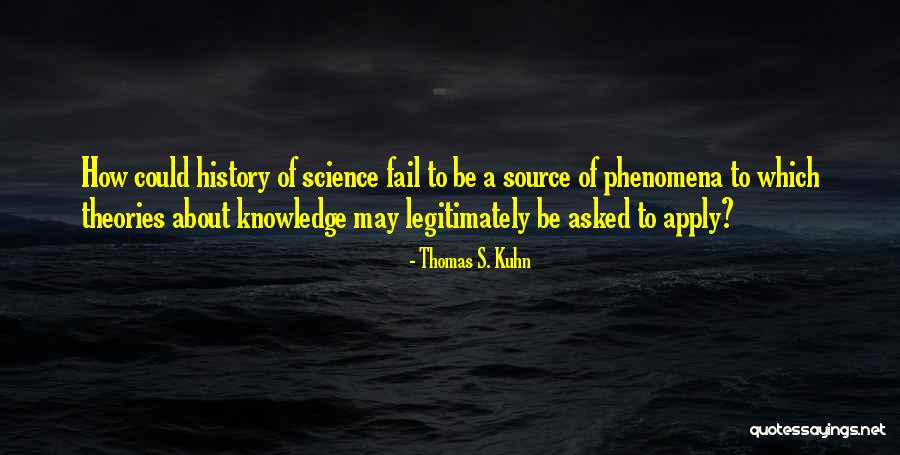
How could history of science fail to be a source of phenomena to which theories about knowledge may legitimately be asked to apply? — Thomas S. Kuhn
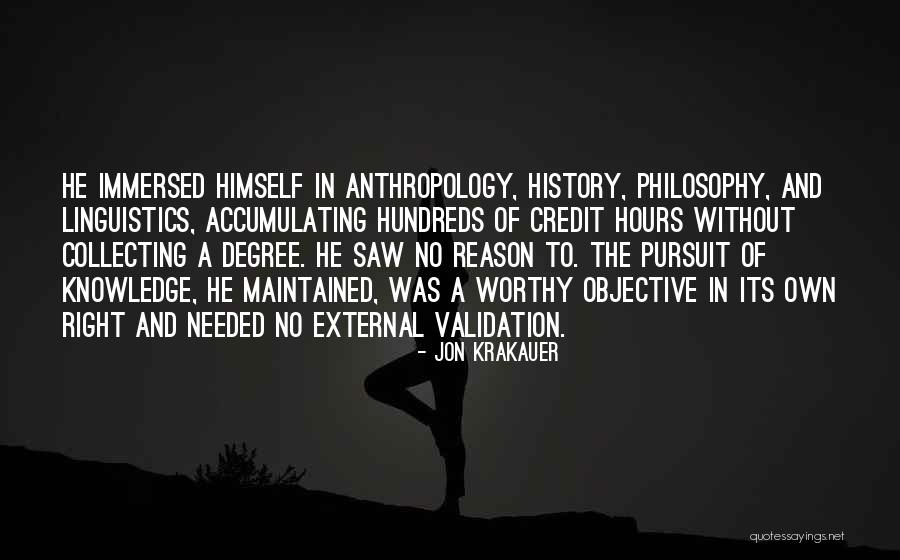
He immersed himself in anthropology, history, philosophy, and linguistics, accumulating hundreds of credit hours without collecting a degree. He saw no reason to. The pursuit of knowledge, he maintained, was a worthy objective in its own right and needed no external validation. — Jon Krakauer
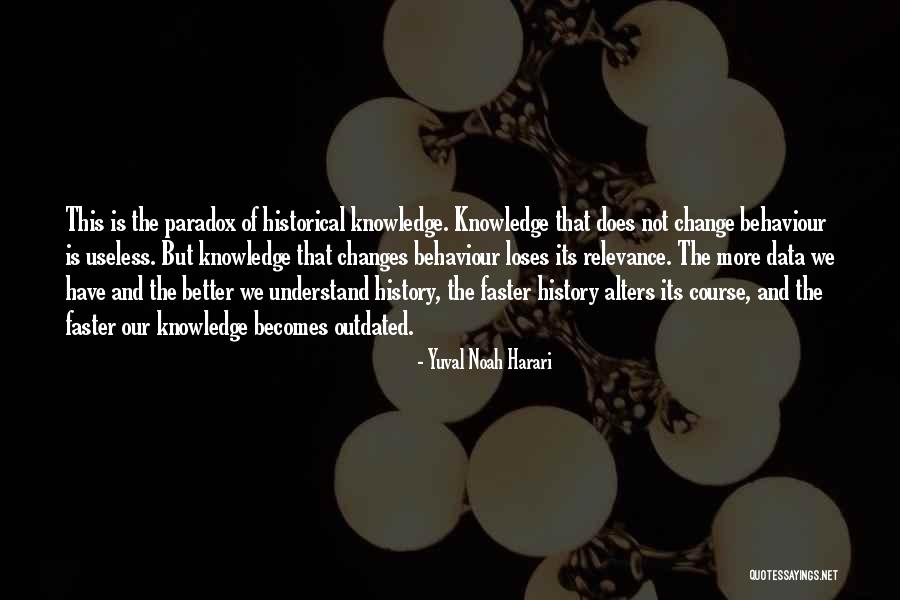
This is the paradox of historical knowledge. Knowledge that does not change behaviour is useless. But knowledge that changes behaviour loses its relevance. The more data we have and the better we understand history, the faster history alters its course, and the faster our knowledge becomes outdated. — Yuval Noah Harari
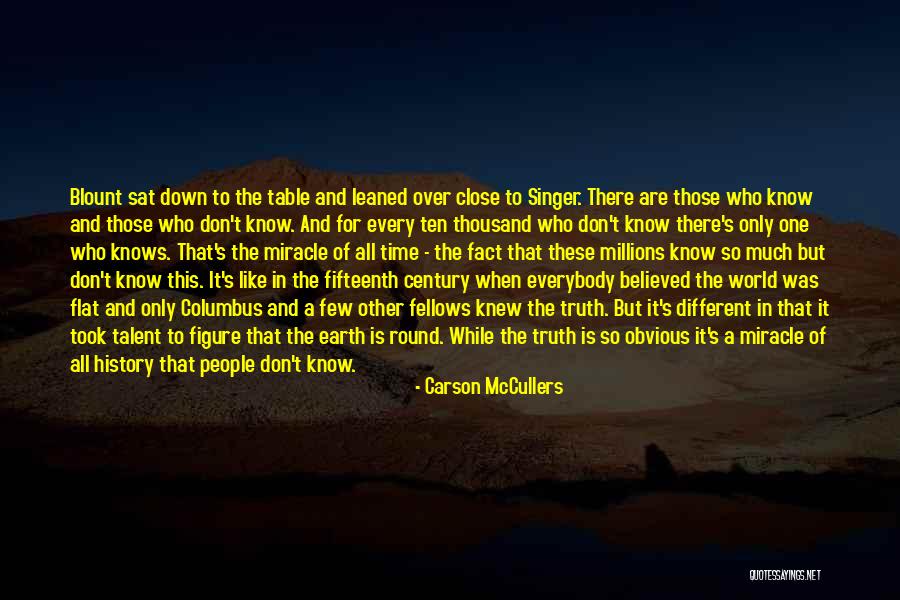
Blount sat down to the table and leaned over close to Singer. There are those who know and those who don't know. And for every ten thousand who don't know there's only one who knows. That's the miracle of all time - the fact that these millions know so much but don't know this. It's like in the fifteenth century when everybody believed the world was flat and only Columbus and a few other fellows knew the truth. But it's different in that it took talent to figure that the earth is round. While the truth is so obvious it's a miracle of all history that people don't know. — Carson McCullers
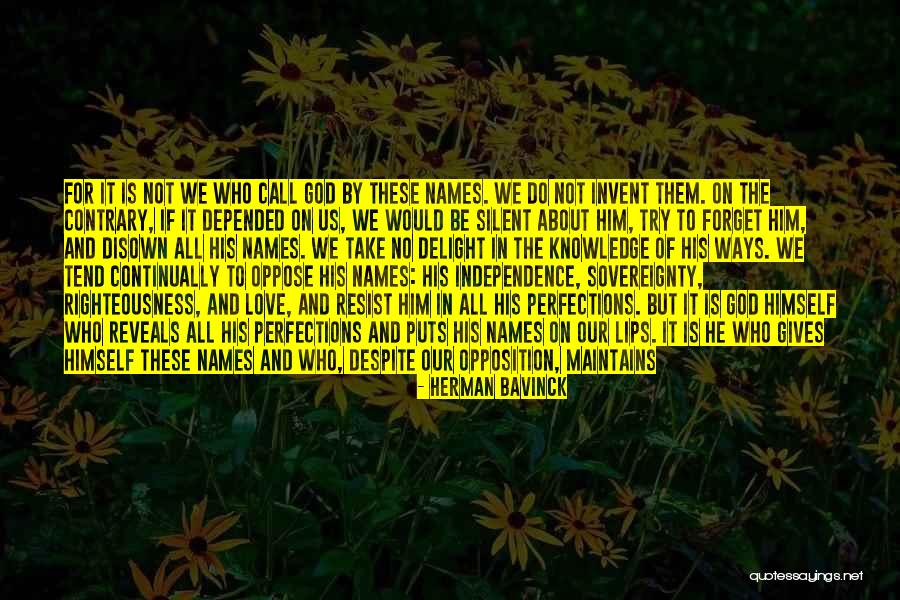
For it is not we who call God by these names. We do not invent them. On the contrary, if it depended on us, we would be silent about him, try to forget him, and disown all his names. We take no delight in the knowledge of his ways. We tend continually to oppose his names: his independence, sovereignty, righteousness, and love, and resist him in all his perfections. But it is God himself who reveals all his perfections and puts his names on our lips. It is he who gives himself these names and who, despite our opposition, maintains them. It is of little use to us to deny his righteousness: every day he demonstrates this quality in history. And so it is with all his attributes. He brings them out despite us. The final goal of all his ways is that his name will shine out in all his works and be written on everyone's forehead (Rev. 22:4). For that reason we have no choice but to name him with the many names his revelation furnishes us. — Herman Bavinck
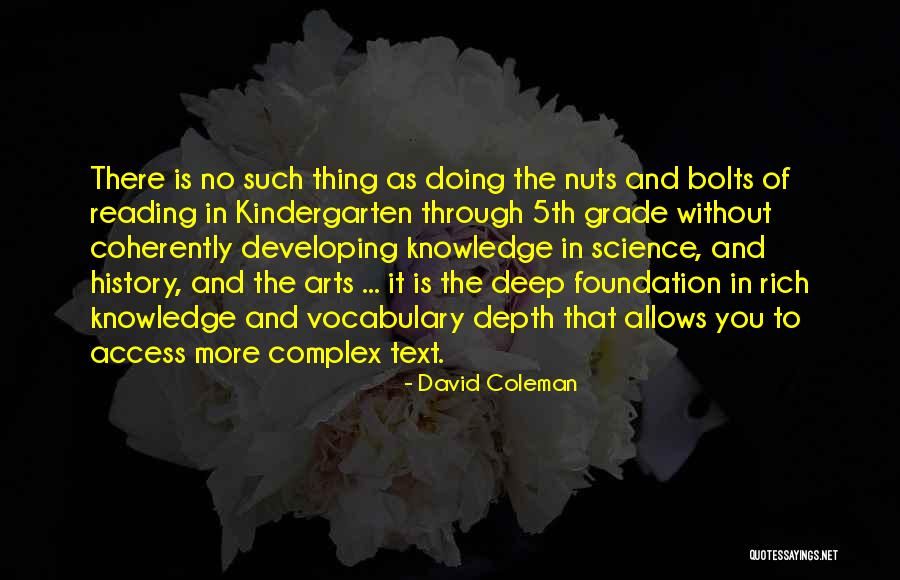
There is no such thing as doing the nuts and bolts of reading in Kindergarten through 5th grade without coherently developing knowledge in science, and history, and the arts ... it is the deep foundation in rich knowledge and vocabulary depth that allows you to access more complex text. — David Coleman
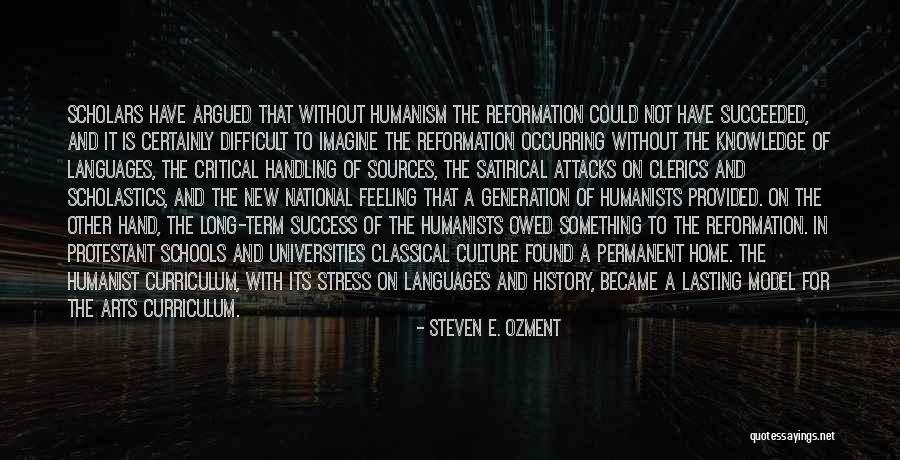
Scholars have argued that without humanism the Reformation could not have succeeded, and it is certainly difficult to imagine the Reformation occurring without the knowledge of languages, the critical handling of sources, the satirical attacks on clerics and scholastics, and the new national feeling that a generation of humanists provided. On the other hand, the long-term success of the humanists owed something to the Reformation. In Protestant schools and universities classical culture found a permanent home. The humanist curriculum, with its stress on languages and history, became a lasting model for the arts curriculum. — Steven E. Ozment
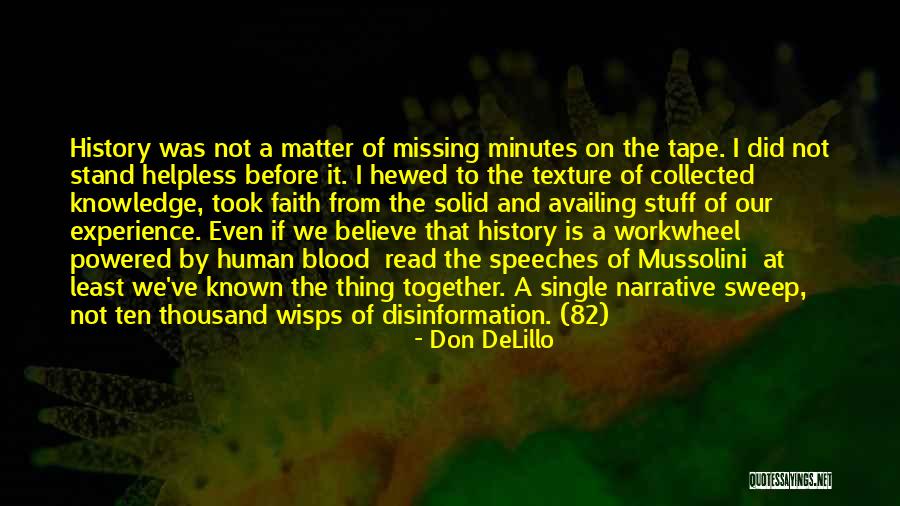
History was not a matter of missing minutes on the tape. I did not stand helpless before it. I hewed to the texture of collected knowledge, took faith from the solid and availing stuff of our experience. Even if we believe that history is a workwheel powered by human blood
read the speeches of Mussolini
at least we've known the thing together. A single narrative sweep, not ten thousand wisps of disinformation. (82) — Don DeLillo
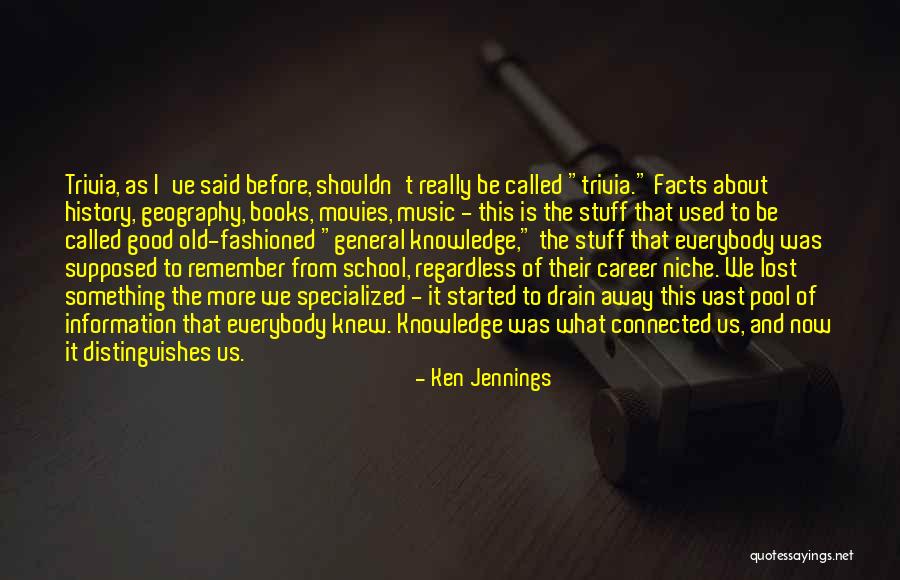
Trivia, as I've said before, shouldn't really be called "trivia." Facts about history, geography, books, movies, music - this is the stuff that used to be called good old-fashioned "general knowledge," the stuff that everybody was supposed to remember from school, regardless of their career niche. We lost something the more we specialized - it started to drain away this vast pool of information that everybody knew. Knowledge was what connected us, and now it distinguishes us. — Ken Jennings
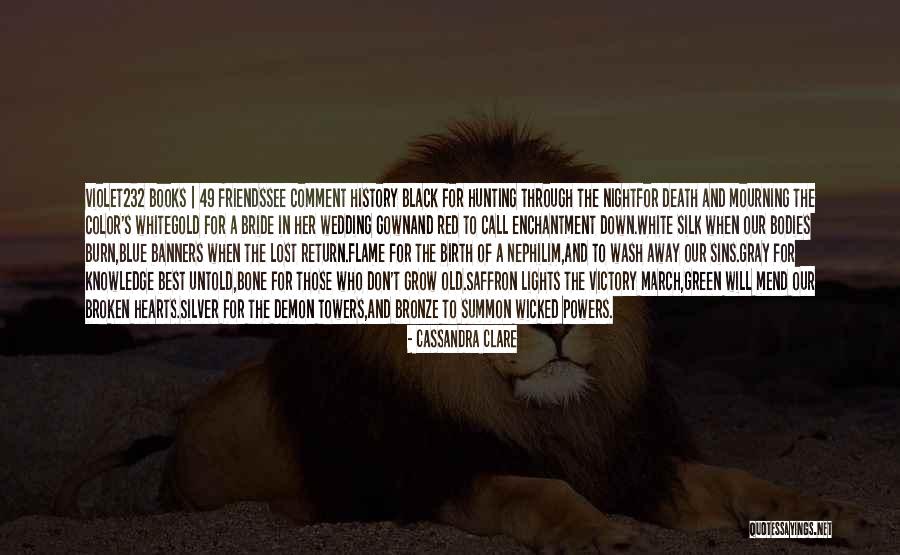
Violet
232 books | 49 friends
see comment history Black for hunting through the night
For death and mourning the color's white
Gold for a bride in her wedding gown
And red to call enchantment down.
White silk when our bodies burn,
Blue banners when the lost return.
Flame for the birth of a Nephilim,
And to wash away our sins.
Gray for knowledge best untold,
Bone for those who don't grow old.
Saffron lights the victory march,
Green will mend our broken hearts.
Silver for the demon towers,
And bronze to summon wicked powers. — Cassandra Clare
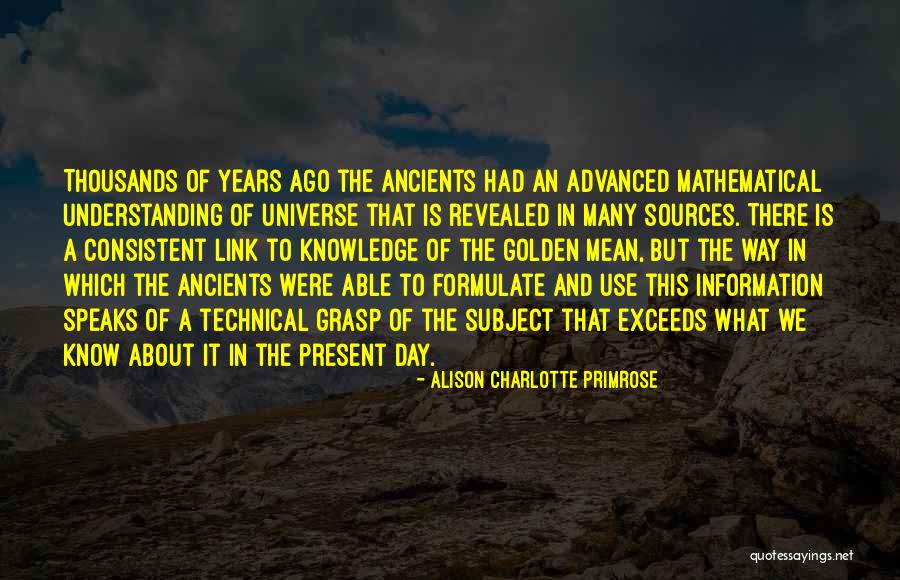
Thousands of years ago the ancients had an advanced mathematical understanding of universe that is revealed in many sources. There is a consistent link to knowledge of the golden mean, but the way in which the ancients were able to formulate and use this information speaks of a technical grasp of the subject that exceeds what we know about it in the present day. — Alison Charlotte Primrose
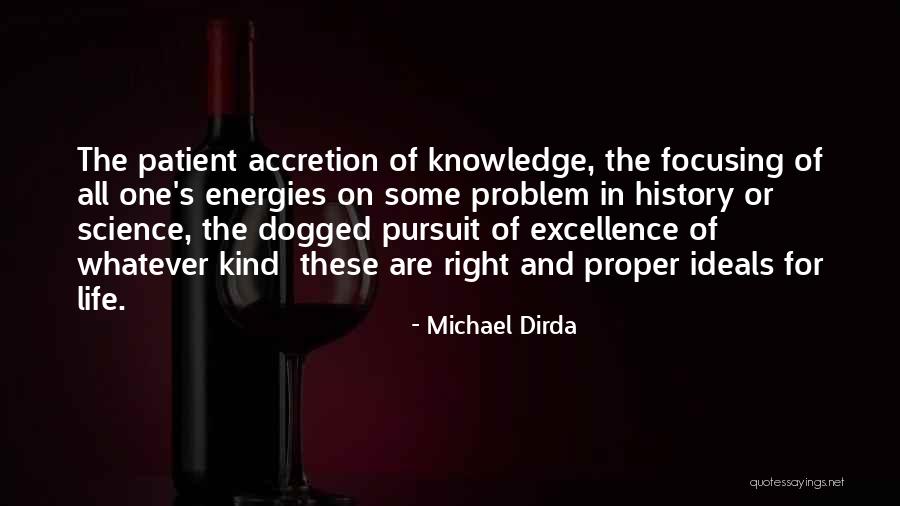
The patient accretion of knowledge, the focusing of all one's energies on some problem in history or science, the dogged pursuit of excellence of whatever kind
these are right and proper ideals for life. — Michael Dirda
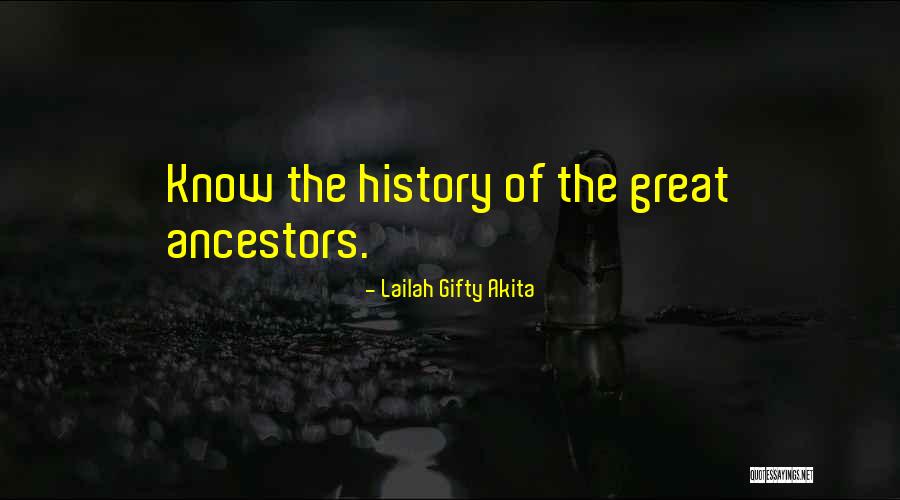
Know the history of the great ancestors. — Lailah Gifty Akita
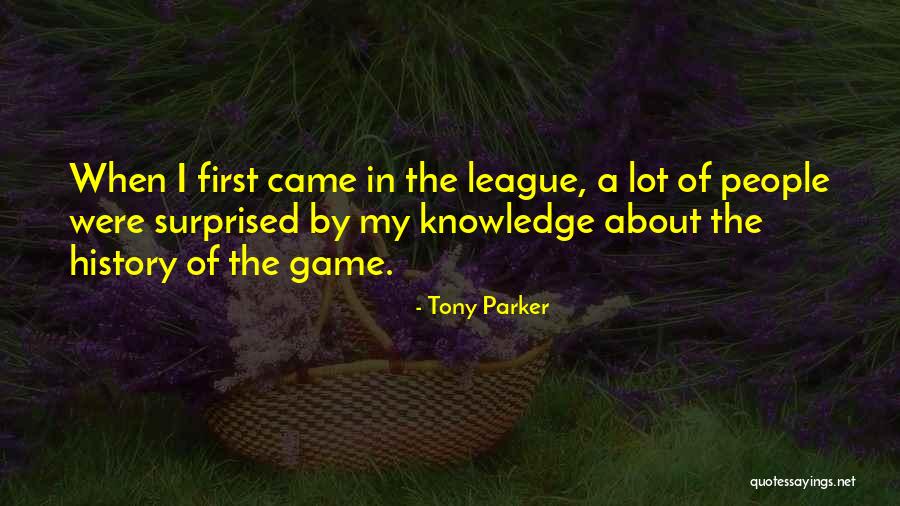
When I first came in the league, a lot of people were surprised by my knowledge about the history of the game. — Tony Parker
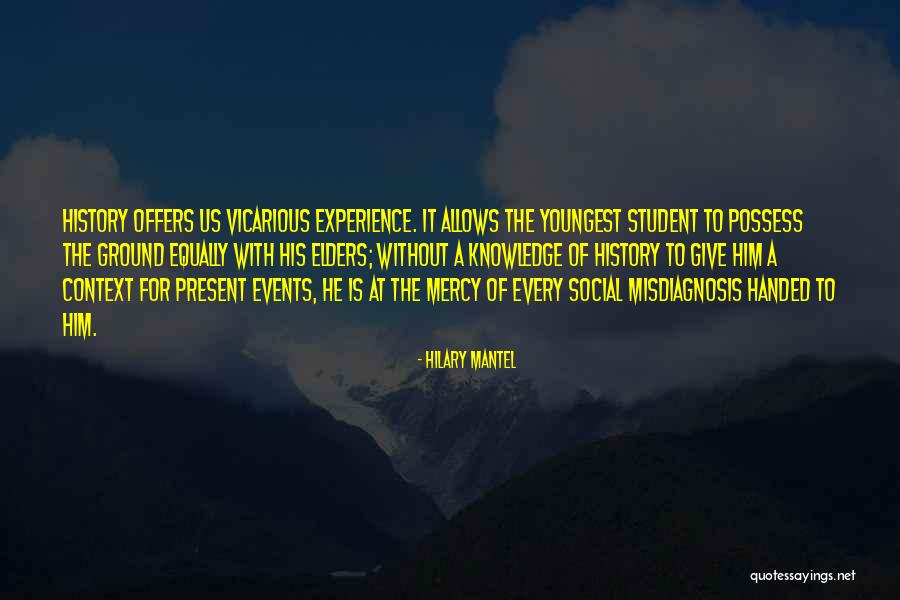
History offers us vicarious experience. It allows the youngest student to possess the ground equally with his elders; without a knowledge of history to give him a context for present events, he is at the mercy of every social misdiagnosis handed to him. — Hilary Mantel
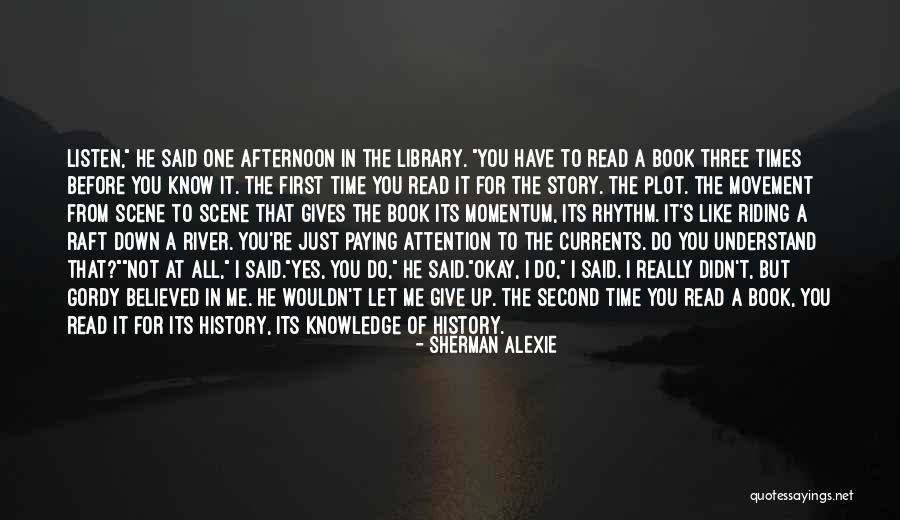
Listen," he said one afternoon in the library. "You have to read a book three times before you know it. The first time you read it for the story. The plot. The movement from scene to scene that gives the book its momentum, its rhythm. It's like riding a raft down a river. You're just paying attention to the currents. Do you understand that?"
"Not at all," I said.
"Yes, you do," he said.
"Okay, I do," I said. I really didn't, but Gordy believed in me. He wouldn't let me give up.
The second time you read a book, you read it for its history, its knowledge of history. — Sherman Alexie
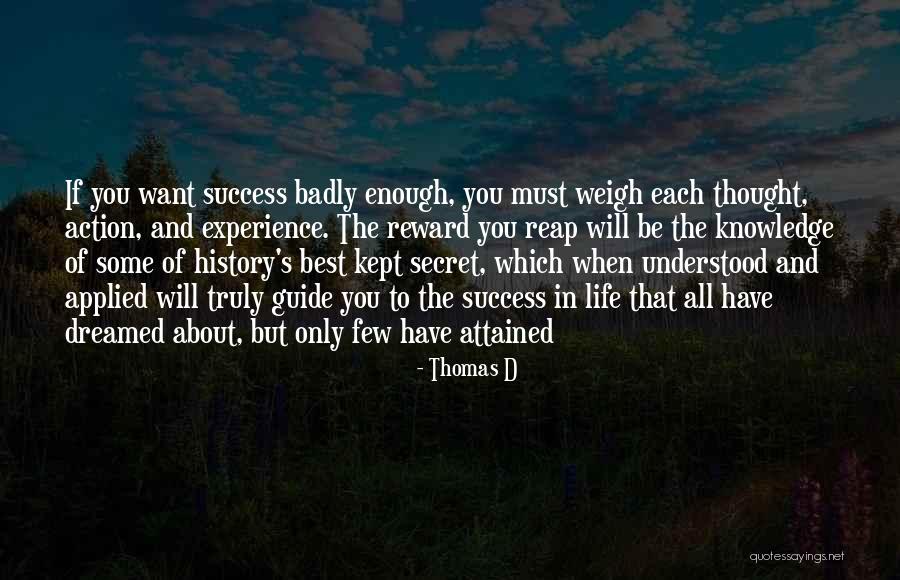
If you want success badly enough, you must weigh each thought, action, and experience. The reward you reap will be the knowledge of some of history's best kept secret, which when understood and applied will truly guide you to the success in life that all have dreamed about, but only few have attained — Thomas D
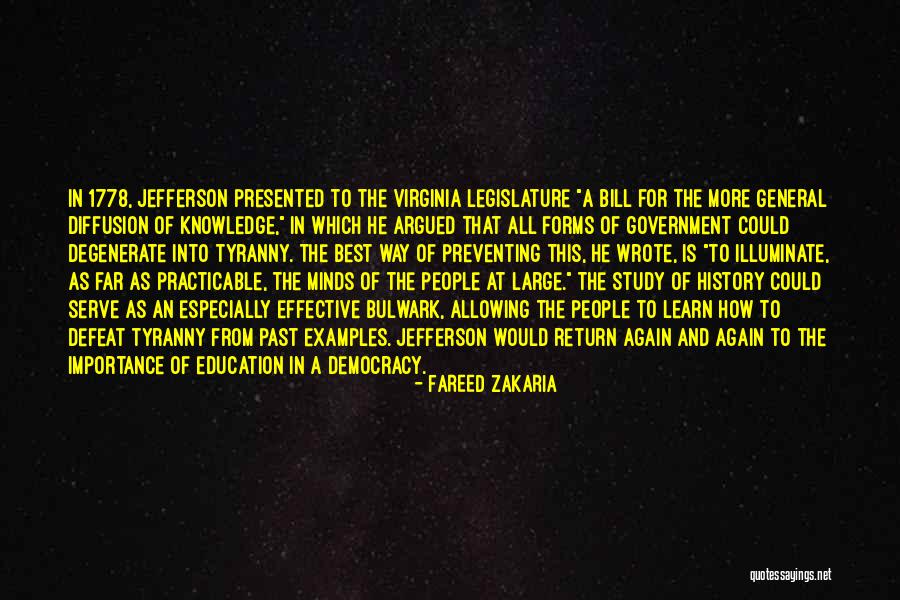
In 1778, Jefferson presented to the Virginia legislature "A Bill for the More General Diffusion of Knowledge," in which he argued that all forms of government could degenerate into tyranny. The best way of preventing this, he wrote, is "to illuminate, as far as practicable, the minds of the people at large." The study of history could serve as an especially effective bulwark, allowing the people to learn how to defeat tyranny from past examples. Jefferson would return again and again to the importance of education in a democracy. — Fareed Zakaria
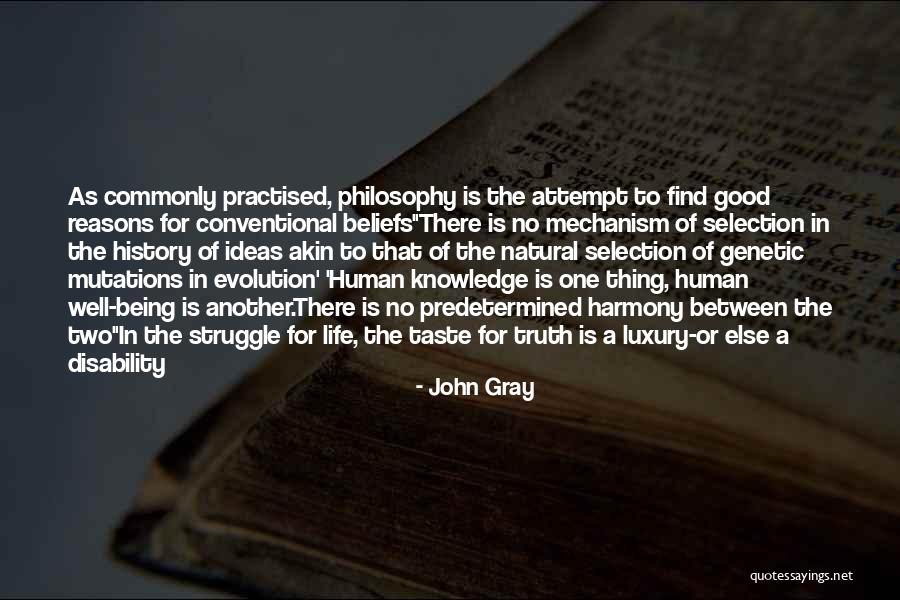
As commonly practised, philosophy is the attempt to find good reasons for conventional beliefs'
'There is no mechanism of selection in the history of ideas akin to that of the natural selection of genetic mutations in evolution'
'Human knowledge is one thing, human well-being is another.There is no predetermined harmony between the two'
'In the struggle for life, the taste for truth is a luxury-or else a disability — John Gray
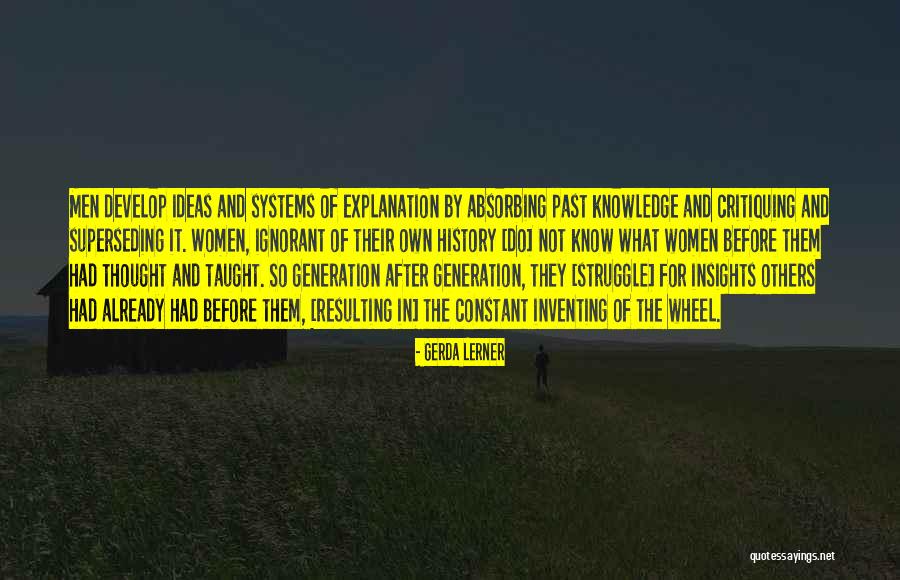
Men develop ideas and systems of explanation by absorbing past knowledge and critiquing and superseding it. Women, ignorant of their own history [do] not know what women before them had thought and taught. So generation after generation, they [struggle] for insights others had already had before them, [resulting in] the constant inventing of the wheel. — Gerda Lerner
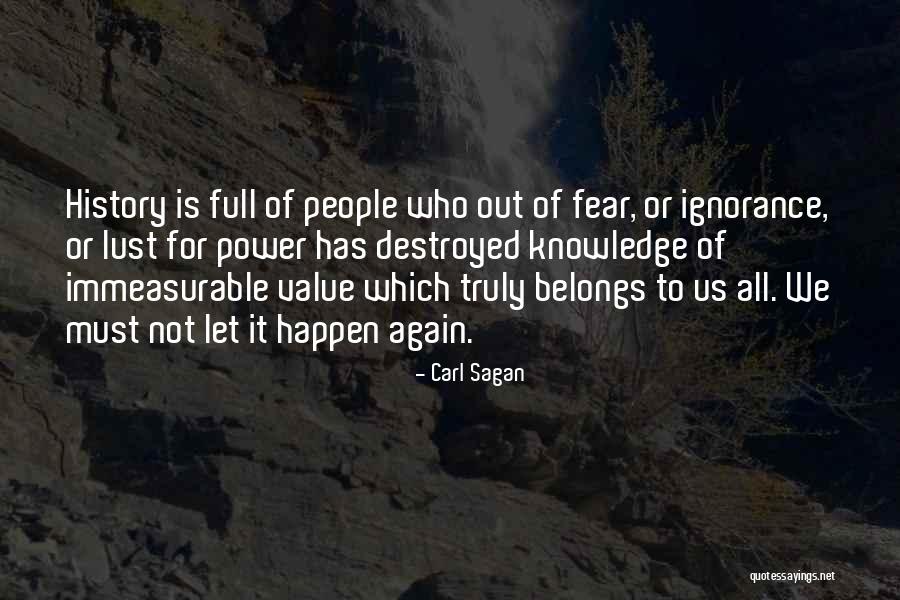
History is full of people who out of fear, or ignorance, or lust for power has destroyed knowledge of immeasurable value which truly belongs to us all. We must not let it happen again. — Carl Sagan
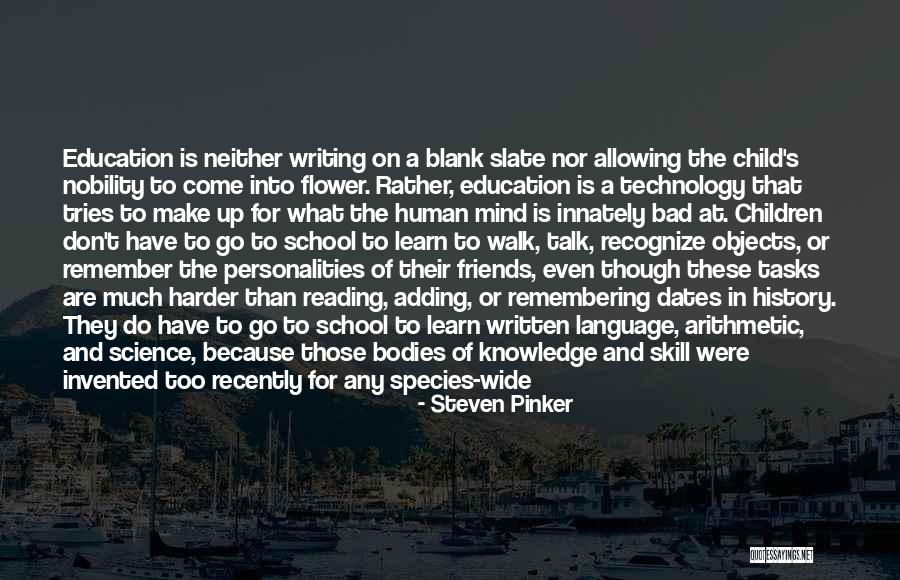
Education is neither writing on a blank slate nor allowing the child's nobility to come into flower. Rather, education is a technology that tries to make up for what the human mind is innately bad at. Children don't have to go to school to learn to walk, talk, recognize objects, or remember the personalities of their friends, even though these tasks are much harder than reading, adding, or remembering dates in history. They do have to go to school to learn written language, arithmetic, and science, because those bodies of knowledge and skill were invented too recently for any species-wide knack for them to have evolved. — Steven Pinker
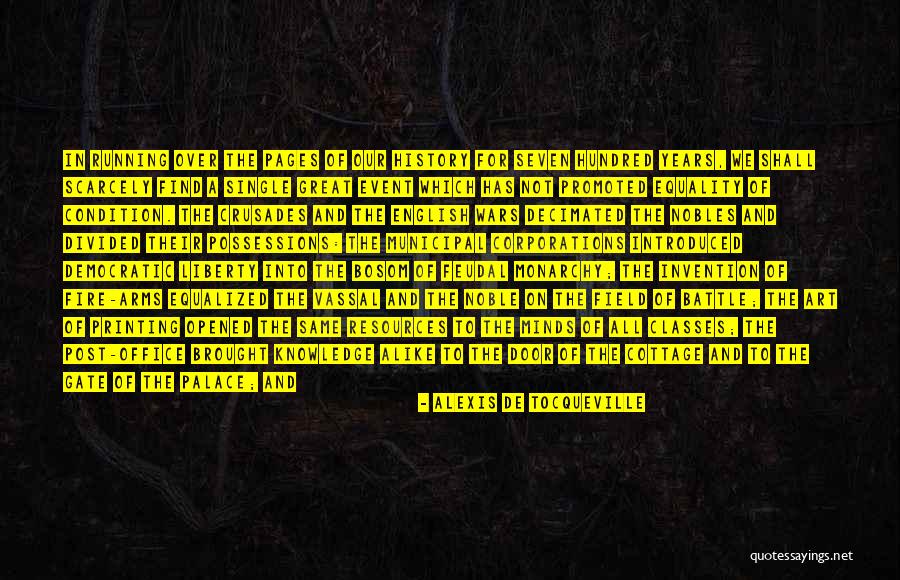
In running over the pages of our history for seven hundred years, we shall scarcely find a single great event which has not promoted equality of condition. The Crusades and the English wars decimated the nobles and divided their possessions: the municipal corporations introduced democratic liberty into the bosom of feudal monarchy; the invention of fire-arms equalized the vassal and the noble on the field of battle; the art of printing opened the same resources to the minds of all classes; the post-office brought knowledge alike to the door of the cottage and to the gate of the palace; and Protestantism proclaimed that all men are alike able to find the road to heaven. The discovery of America opened a thousand new paths to fortune, and led obscure adventurers to wealth and power. — Alexis De Tocqueville
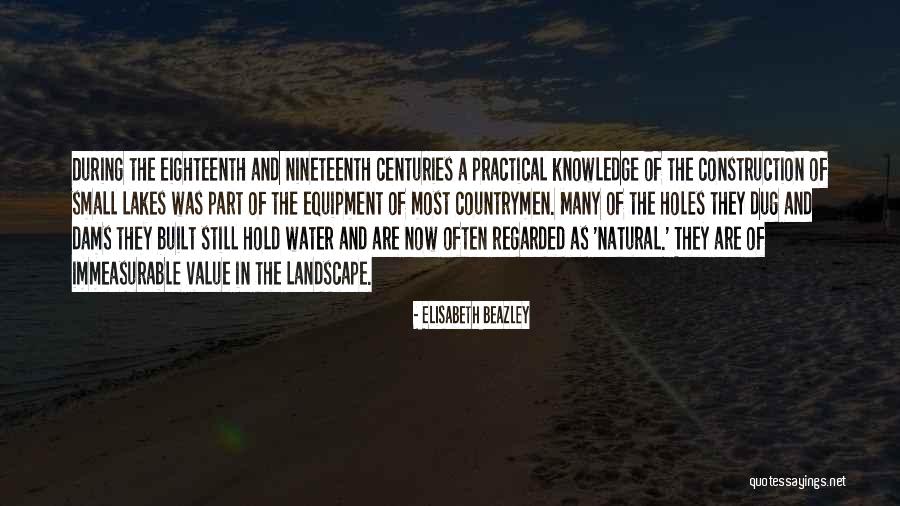
During the eighteenth and nineteenth centuries a practical knowledge of the construction of small lakes was part of the equipment of most countrymen. Many of the holes they dug and dams they built still hold water and are now often regarded as 'natural.' They are of immeasurable value in the landscape. — Elisabeth Beazley
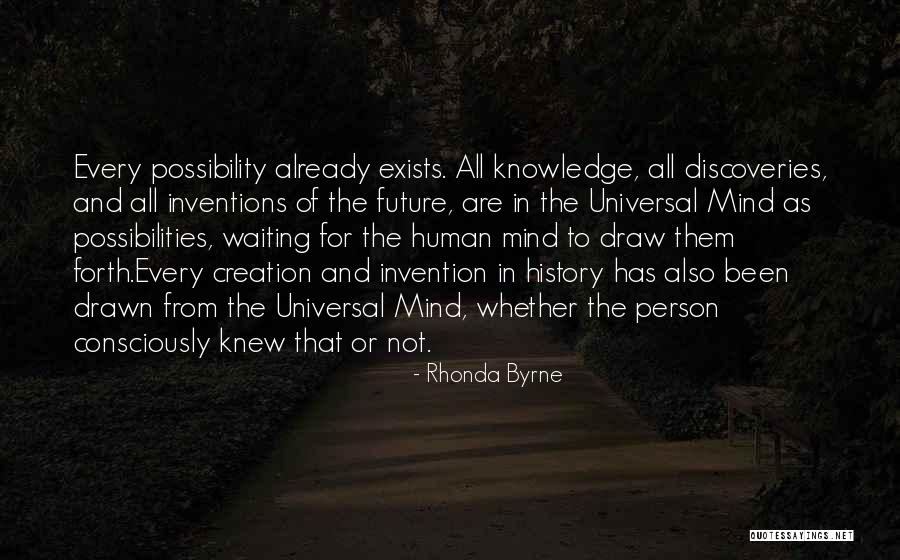
Every possibility already exists. All knowledge, all discoveries, and all inventions of the future, are in the Universal Mind as possibilities, waiting for the human mind to draw them forth.
Every creation and invention in history has also been drawn from the Universal Mind, whether the person consciously knew that or not. — Rhonda Byrne
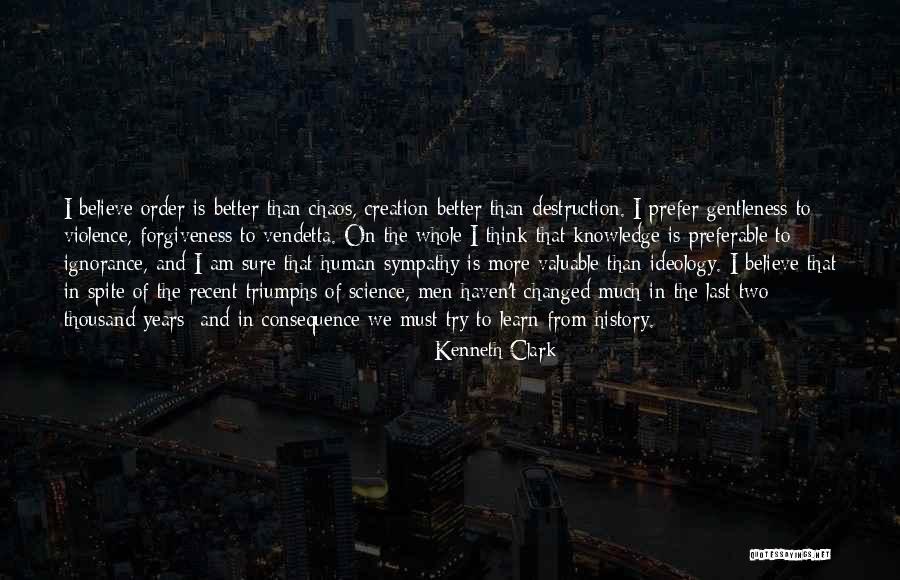
I believe order is better than chaos, creation better than destruction. I prefer gentleness to violence, forgiveness to vendetta. On the whole I think that knowledge is preferable to ignorance, and I am sure that human sympathy is more valuable than ideology. I believe that in spite of the recent triumphs of science, men haven't changed much in the last two thousand years; and in consequence we must try to learn from history. — Kenneth Clark
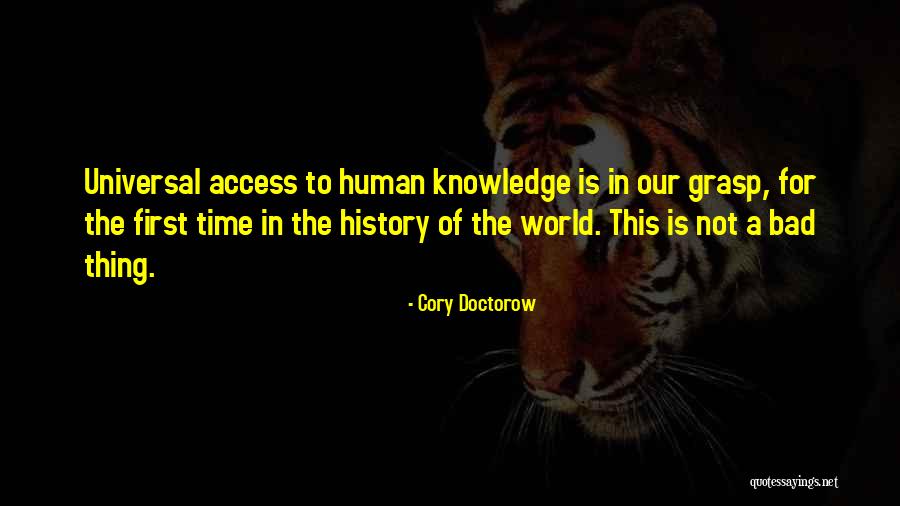
Universal access to human knowledge is in our grasp, for the first time in the history of the world. This is not a bad thing. — Cory Doctorow
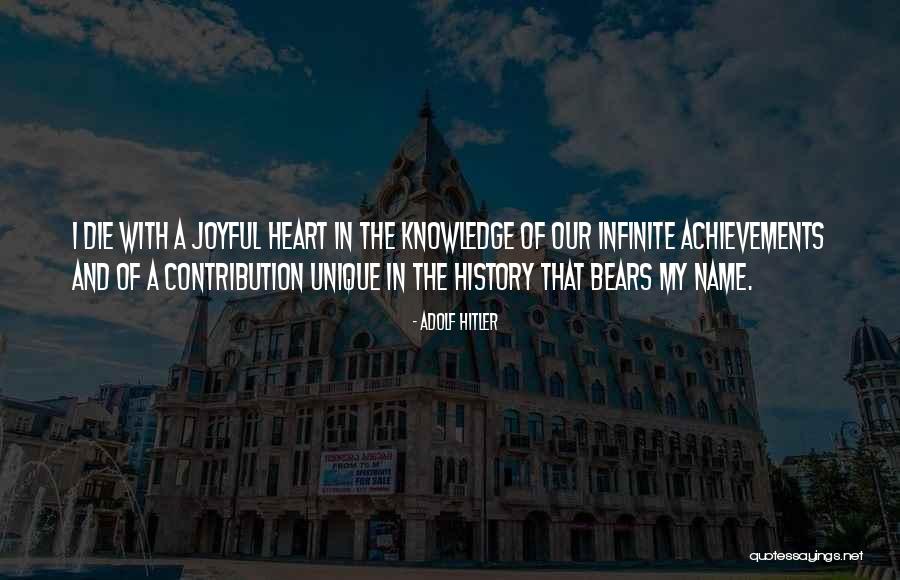
I die with a joyful heart in the knowledge of our infinite achievements and of a contribution unique in the history that bears my name. — Adolf Hitler
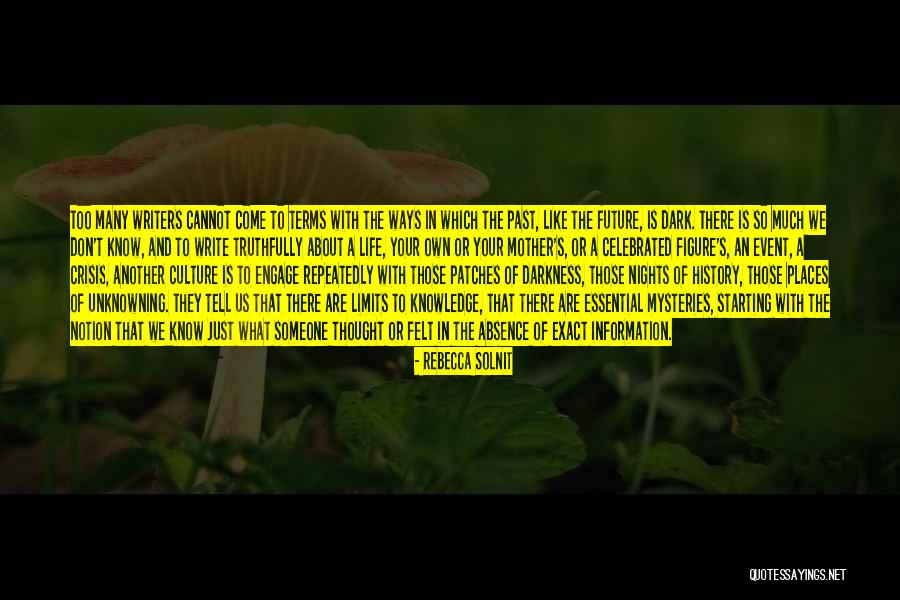
Too many writers cannot come to terms with the ways in which the past, like the future, is dark. There is so much we don't know, and to write truthfully about a life, your own or your mother's, or a celebrated figure's, an event, a crisis, another culture is to engage repeatedly with those patches of darkness, those nights of history, those places of unknowning. They tell us that there are limits to knowledge, that there are essential mysteries, starting with the notion that we know just what someone thought or felt in the absence of exact information. — Rebecca Solnit
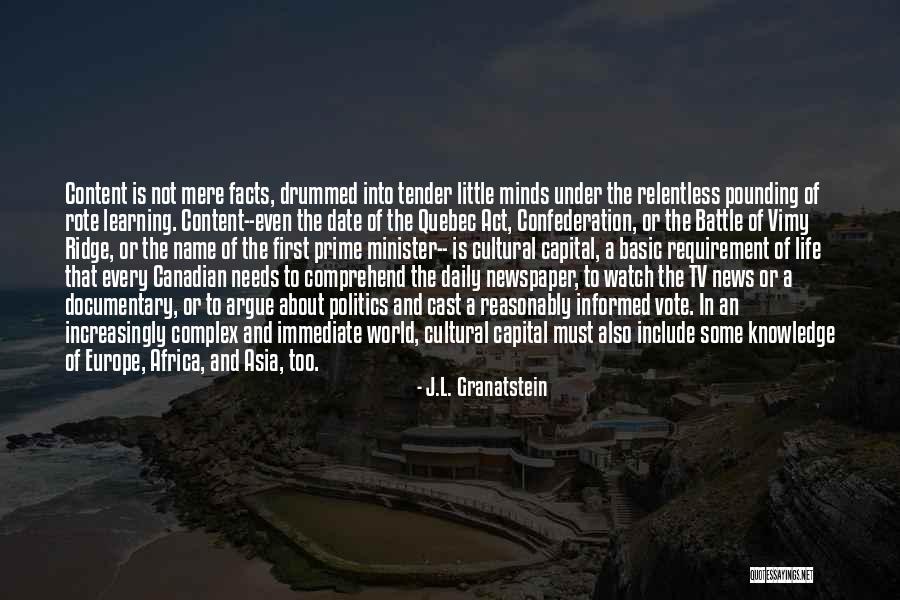
Content is not mere facts, drummed into tender little minds under the relentless pounding of rote learning. Content--even the date of the Quebec Act, Confederation, or the Battle of Vimy Ridge, or the name of the first prime minister-- is cultural capital, a basic requirement of life that every Canadian needs to comprehend the daily newspaper, to watch the TV news or a documentary, or to argue about politics and cast a reasonably informed vote. In an increasingly complex and immediate world, cultural capital must also include some knowledge of Europe, Africa, and Asia, too. — J.L. Granatstein
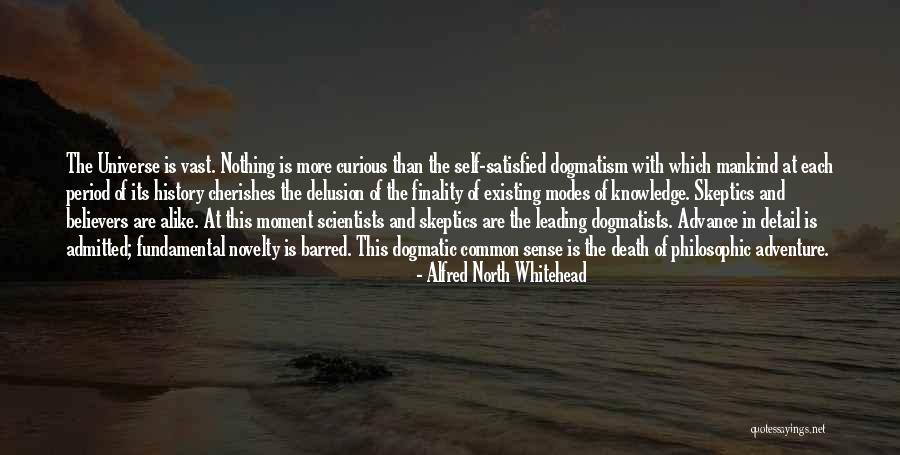
The Universe is vast. Nothing is more curious than the self-satisfied dogmatism with which mankind at each period of its history cherishes the delusion of the finality of existing modes of knowledge. Skeptics and believers are alike. At this moment scientists and skeptics are the leading dogmatists. Advance in detail is admitted; fundamental novelty is barred. This dogmatic common sense is the death of philosophic adventure. — Alfred North Whitehead
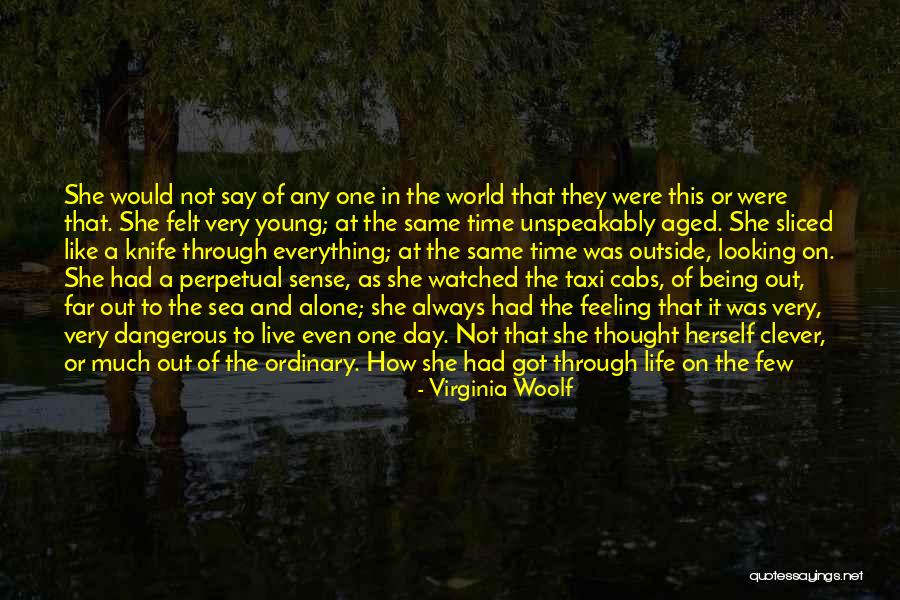
She would not say of any one in the world that they were this or were that. She felt very young; at the same time unspeakably aged. She sliced like a knife through everything; at the same time was outside, looking on. She had a perpetual sense, as she watched the taxi cabs, of being out, far out to the sea and alone; she always had the feeling that it was very, very dangerous to live even one day. Not that she thought herself clever, or much out of the ordinary. How she had got through life on the few twigs of knowledge Fraulein Daniels gave them she could not think. She knew nothing; no language, no history; she scarcely read a book now, except memoirs in bed; and yet to her it was absolutely absorbing; all this; the cabs passing; and she would not say of Peter, she would not say of herself, I am this, I am that. — Virginia Woolf
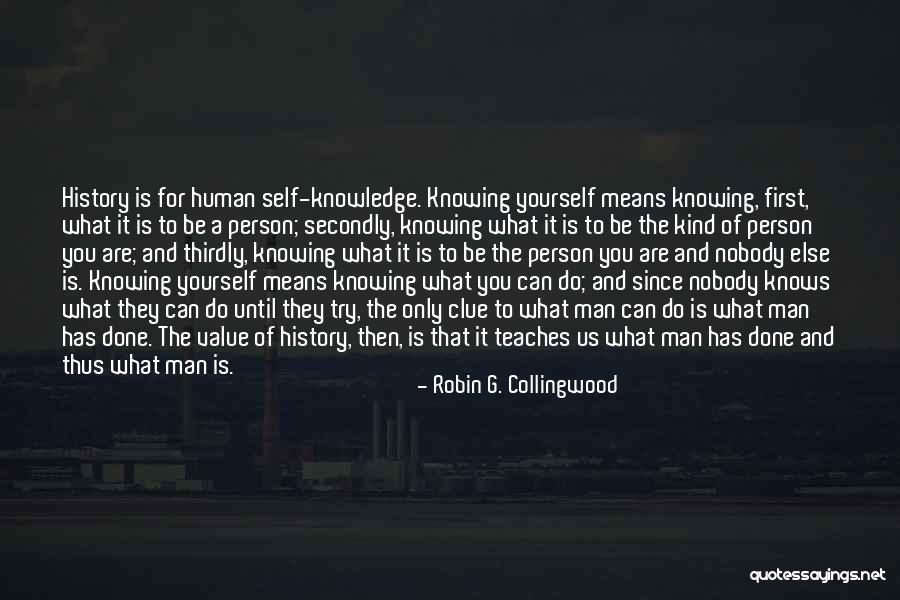
History is for human self-knowledge. Knowing yourself means knowing, first, what it is to be a person; secondly, knowing what it is to be the kind of person you are; and thirdly, knowing what it is to be the person you are and nobody else is. Knowing yourself means knowing what you can do; and since nobody knows what they can do until they try, the only clue to what man can do is what man has done. The value of history, then, is that it teaches us what man has done and thus what man is. — Robin G. Collingwood
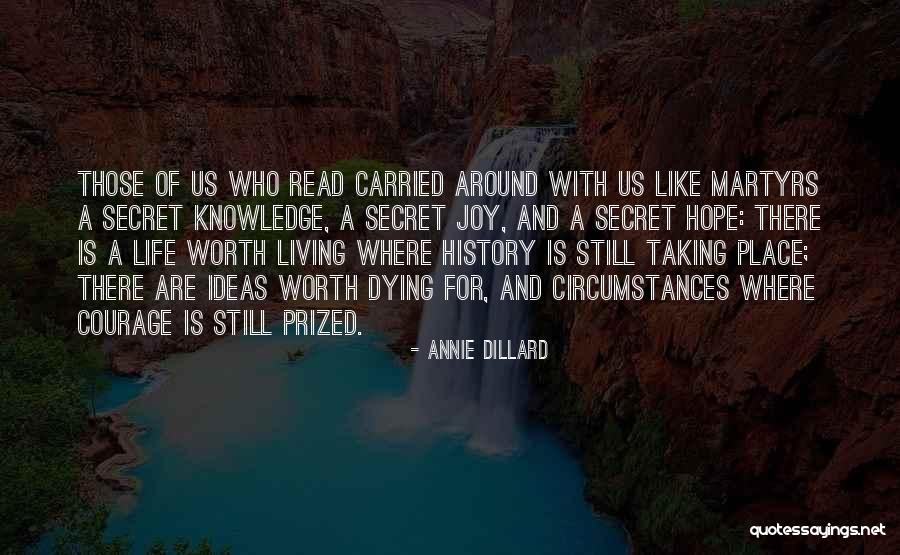
Those of us who read carried around with us like martyrs a secret knowledge, a secret joy, and a secret hope: There is a life worth living where history is still taking place; there are ideas worth dying for, and circumstances where courage is still prized. — Annie Dillard
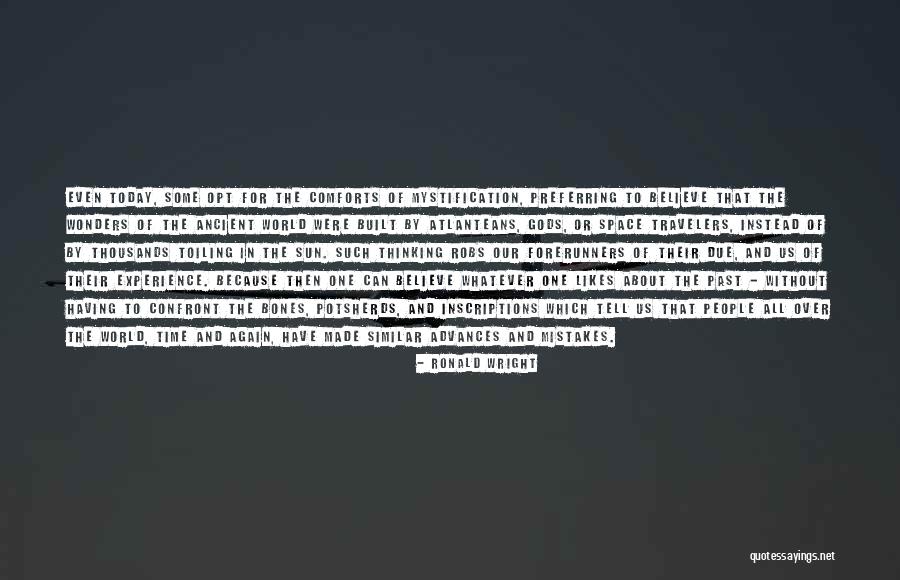
Even today, some opt for the comforts of mystification, preferring to believe that the wonders of the ancient world were built by Atlanteans, gods, or space travelers, instead of by thousands toiling in the sun. Such thinking robs our forerunners of their due, and us of their experience. Because then one can believe whatever one likes about the past - without having to confront the bones, potsherds, and inscriptions which tell us that people all over the world, time and again, have made similar advances and mistakes. — Ronald Wright
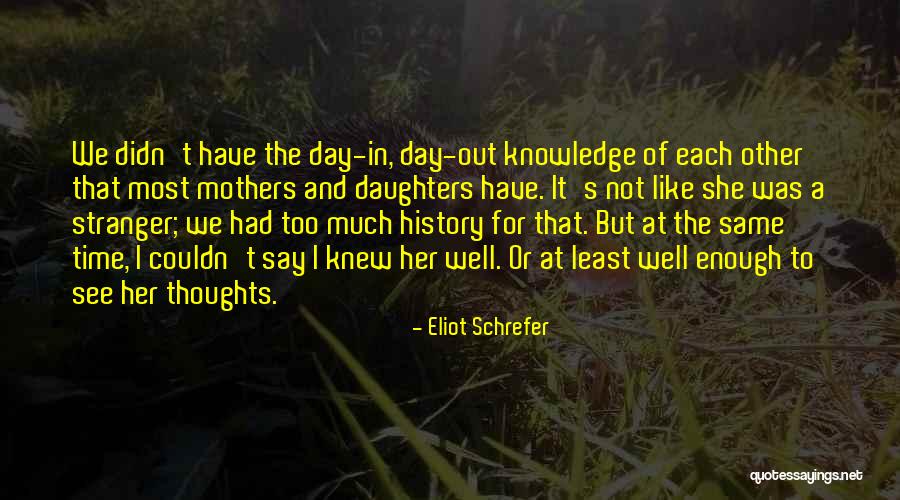
We didn't have the day-in, day-out knowledge of each other that most mothers and daughters have. It's not like she was a stranger; we had too much history for that. But at the same time, I couldn't say I knew her well. Or at least well enough to see her thoughts. — Eliot Schrefer
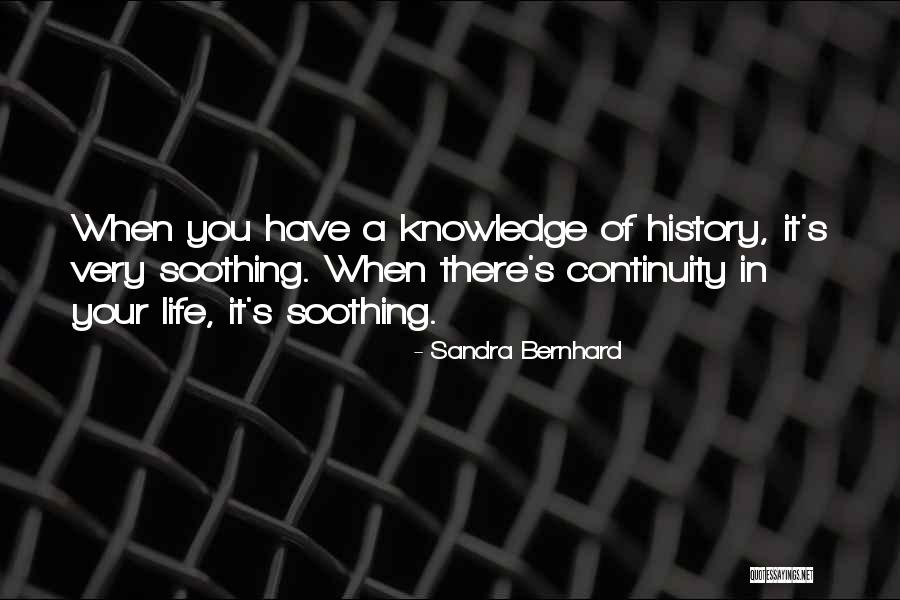
When you have a knowledge of history, it's very soothing. When there's continuity in your life, it's soothing. — Sandra Bernhard
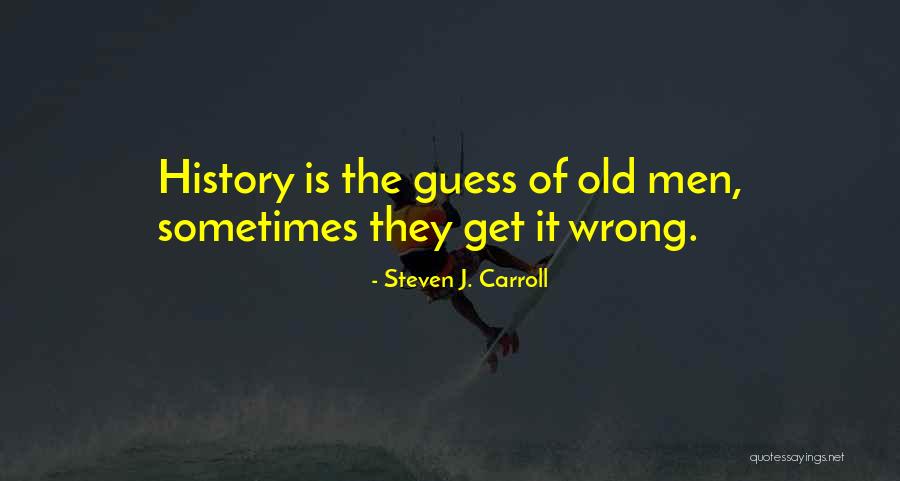
History is the guess of old men, sometimes they get it wrong. — Steven J. Carroll
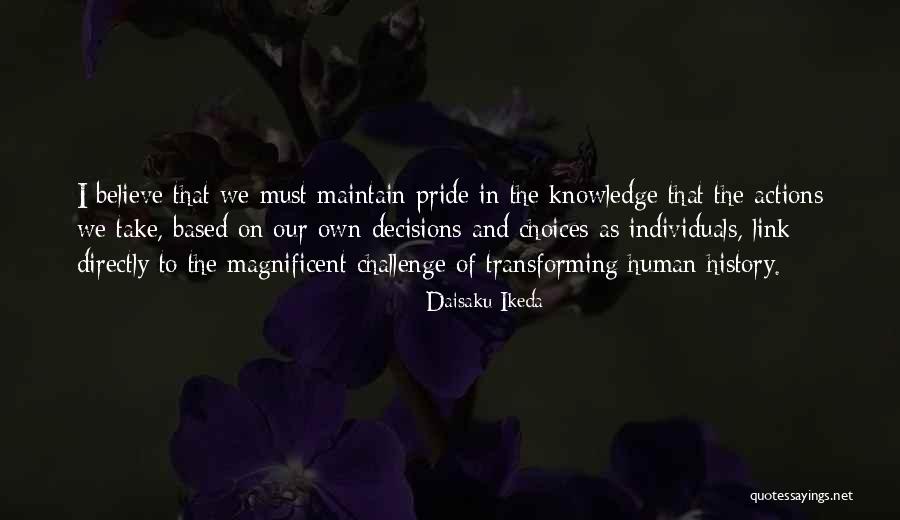
I believe that we must maintain pride in the knowledge that the actions we take, based on our own decisions and choices as individuals, link directly to the magnificent challenge of transforming human history. — Daisaku Ikeda
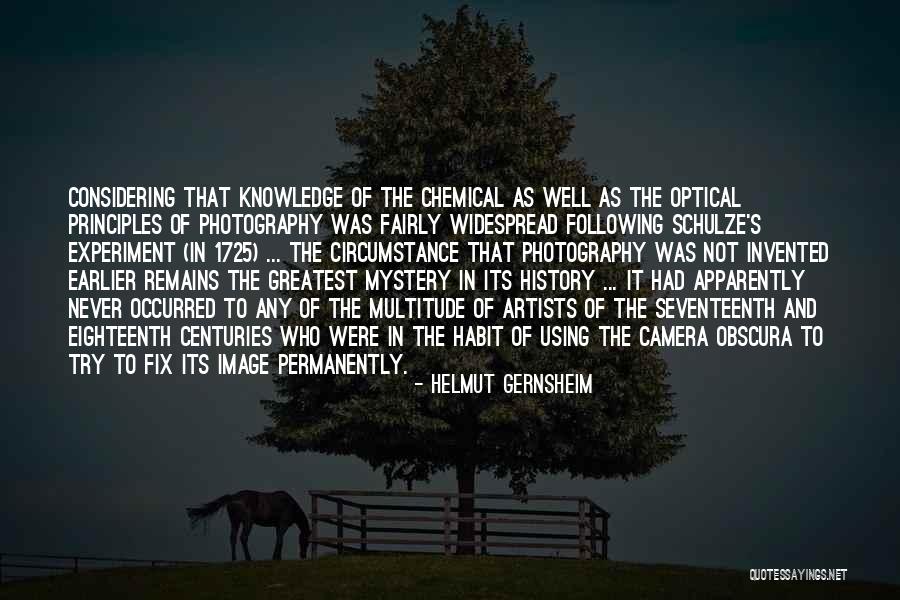
Considering that knowledge of the chemical as well as the optical principles of photography was fairly widespread following Schulze's experiment (in 1725) ... the circumstance that photography was not invented earlier remains the greatest mystery in its history ... It had apparently never occurred to any of the multitude of artists of the seventeenth and eighteenth centuries who were in the habit of using the camera obscura to try to fix its image permanently. — Helmut Gernsheim
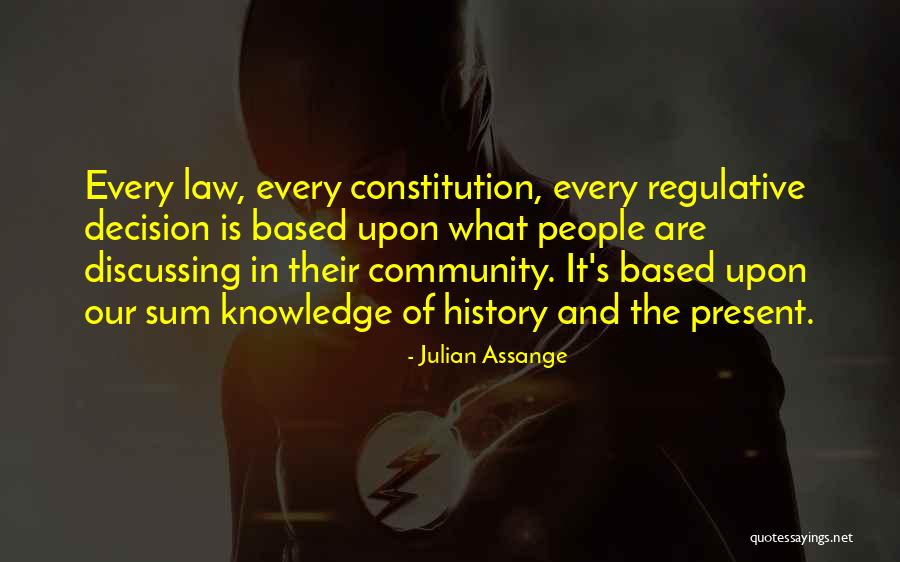
Every law, every constitution, every regulative decision is based upon what people are discussing in their community. It's based upon our sum knowledge of history and the present. — Julian Assange
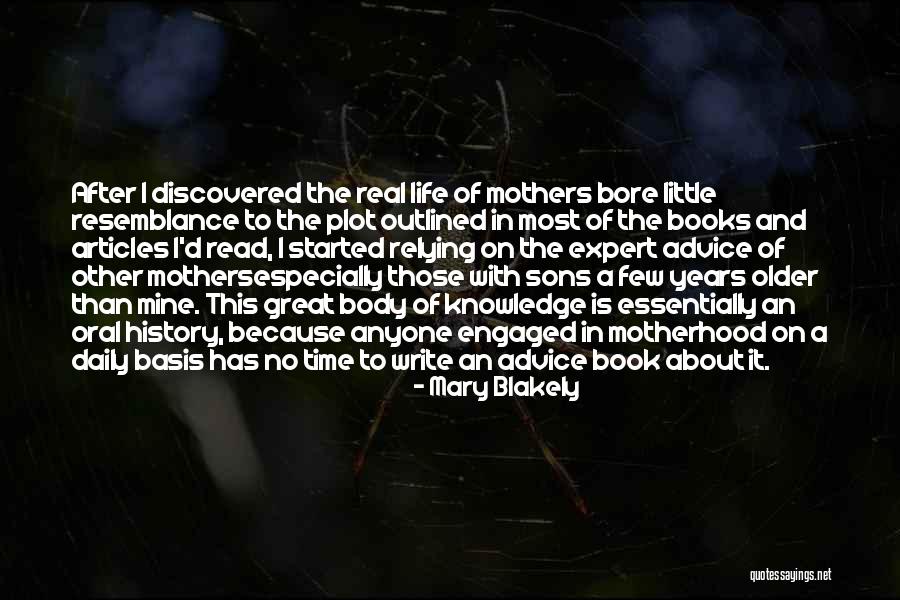
After I discovered the real life of mothers bore little resemblance to the plot outlined in most of the books and articles I'd read, I started relying on the expert advice of other mothers
especially those with sons a few years older than mine. This great body of knowledge is essentially an oral history, because anyone engaged in motherhood on a daily basis has no time to write an advice book about it. — Mary Blakely
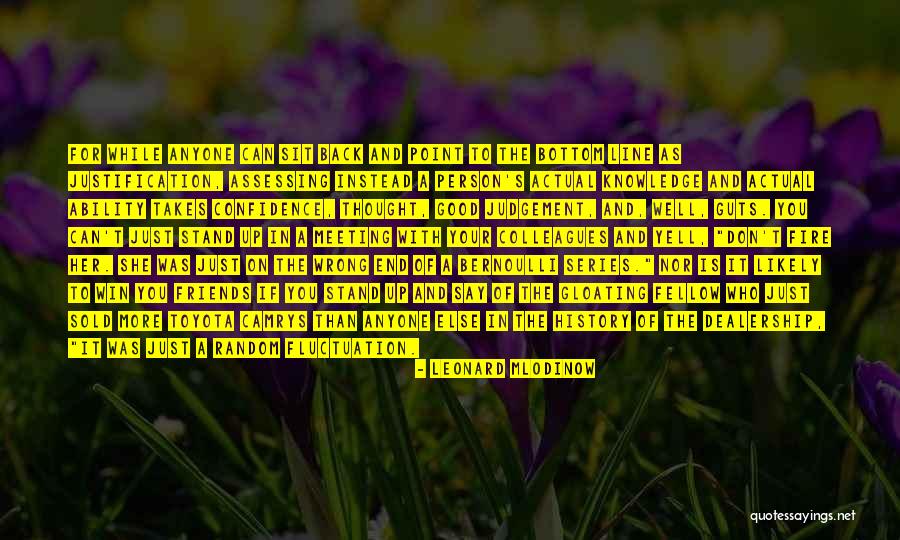
For while anyone can sit back and point to the bottom line as justification, assessing instead a person's actual knowledge and actual ability takes confidence, thought, good judgement, and, well, guts. You can't just stand up in a meeting with your colleagues and yell, "Don't fire her. She was just on the wrong end of a Bernoulli series." Nor is it likely to win you friends if you stand up and say of the gloating fellow who just sold more Toyota Camrys than anyone else in the history of the dealership, "It was just a random fluctuation. — Leonard Mlodinow
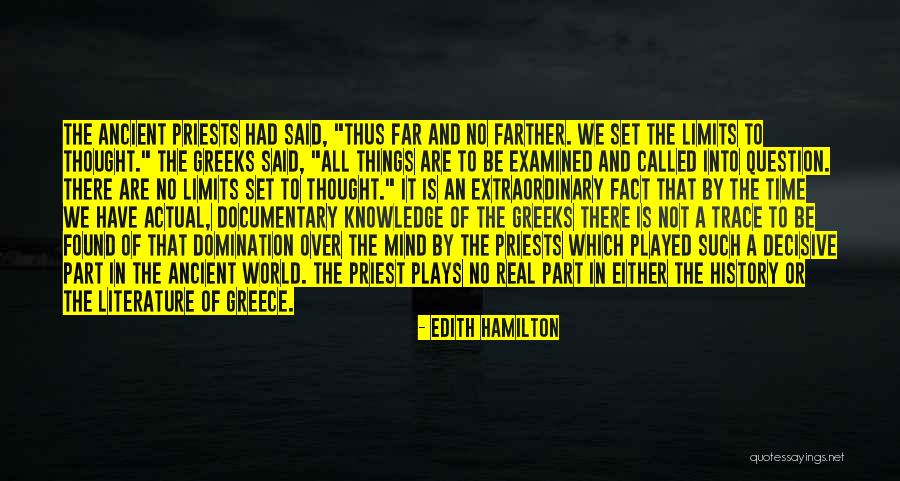
The ancient priests had said, "Thus far and no farther. We set the limits to thought." The Greeks said, "All things are to be examined and called into question. There are no limits set to thought." It is an extraordinary fact that by the time we have actual, documentary knowledge of the Greeks there is not a trace to be found of that domination over the mind by the priests which played such a decisive part in the ancient world. The priest plays no real part in either the history or the literature of Greece. — Edith Hamilton
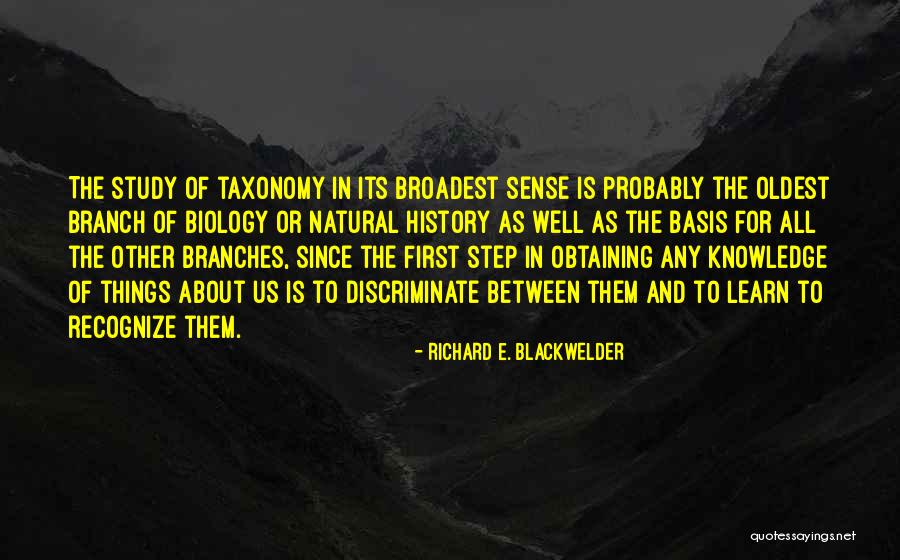
The study of taxonomy in its broadest sense is probably the oldest branch of biology or natural history as well as the basis for all the other branches, since the first step in obtaining any knowledge of things about us is to discriminate between them and to learn to recognize them. — Richard E. Blackwelder
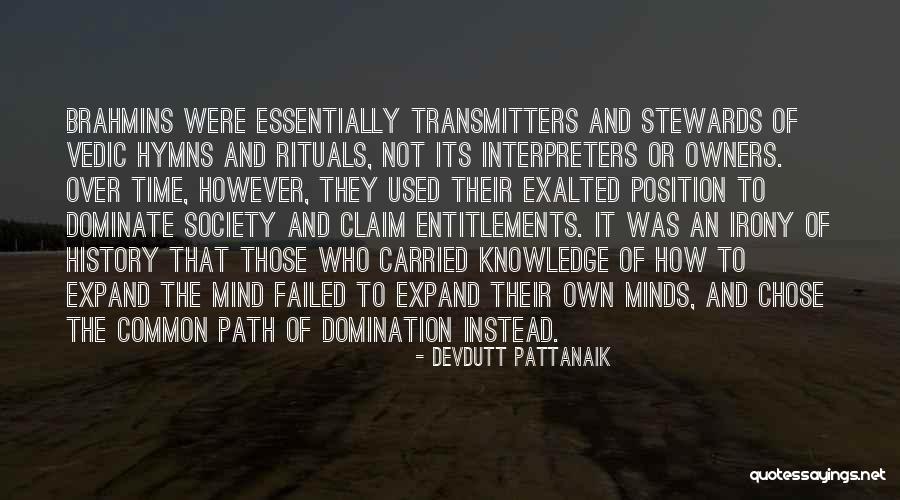
Brahmins were essentially transmitters and stewards of Vedic hymns and rituals, not its interpreters or owners. Over time, however, they used their exalted position to dominate society and claim entitlements. It was an irony of history that those who carried knowledge of how to expand the mind failed to expand their own minds, and chose the common path of domination instead. — Devdutt Pattanaik
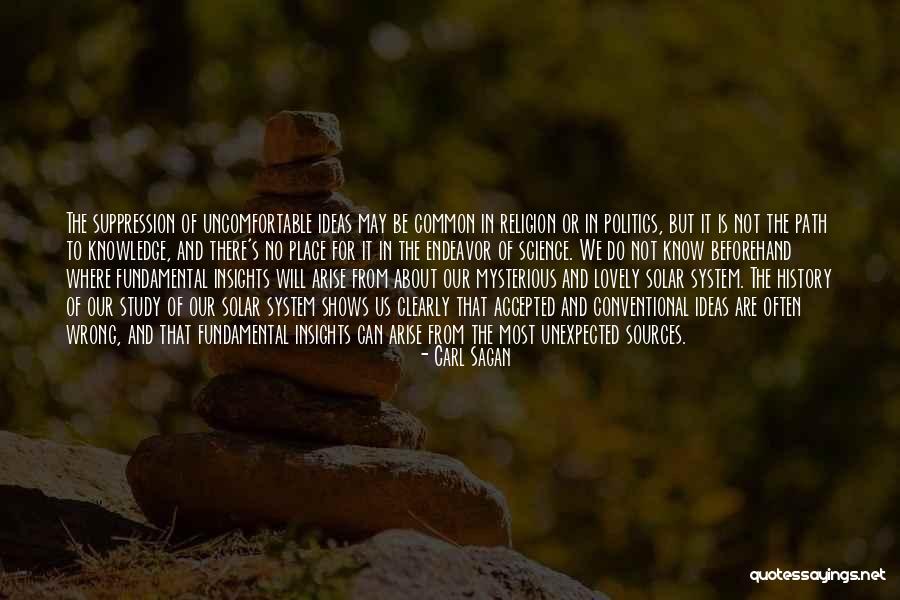
The suppression of uncomfortable ideas may be common in religion or in politics, but it is not the path to knowledge, and there's no place for it in the endeavor of science. We do not know beforehand where fundamental insights will arise from about our mysterious and lovely solar system. The history of our study of our solar system shows us clearly that accepted and conventional ideas are often wrong, and that fundamental insights can arise from the most unexpected sources. — Carl Sagan
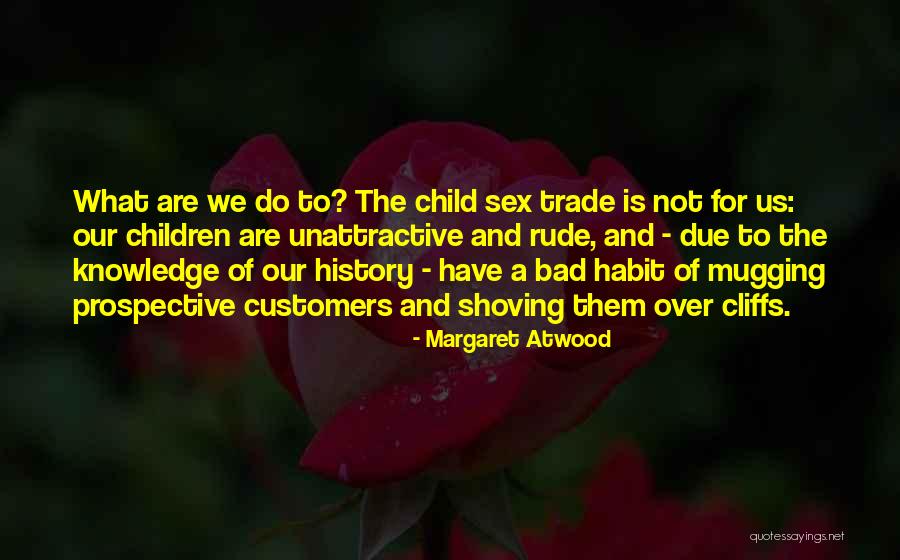
What are we do to? The child sex trade is not for us: our children are unattractive and rude, and - due to the knowledge of our history - have a bad habit of mugging prospective customers and shoving them over cliffs. — Margaret Atwood
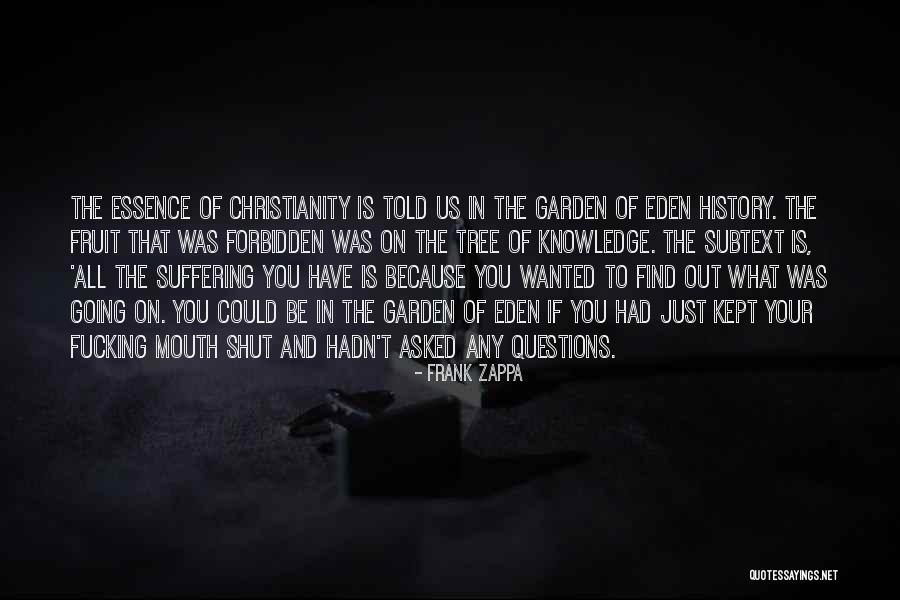
The essence of Christianity is told us in the Garden of Eden history. The fruit that was forbidden was on the tree of knowledge. The subtext is, 'All the suffering you have is because you wanted to find out what was going on. You could be in the Garden of Eden if you had just kept your fucking mouth shut and hadn't asked any questions. — Frank Zappa
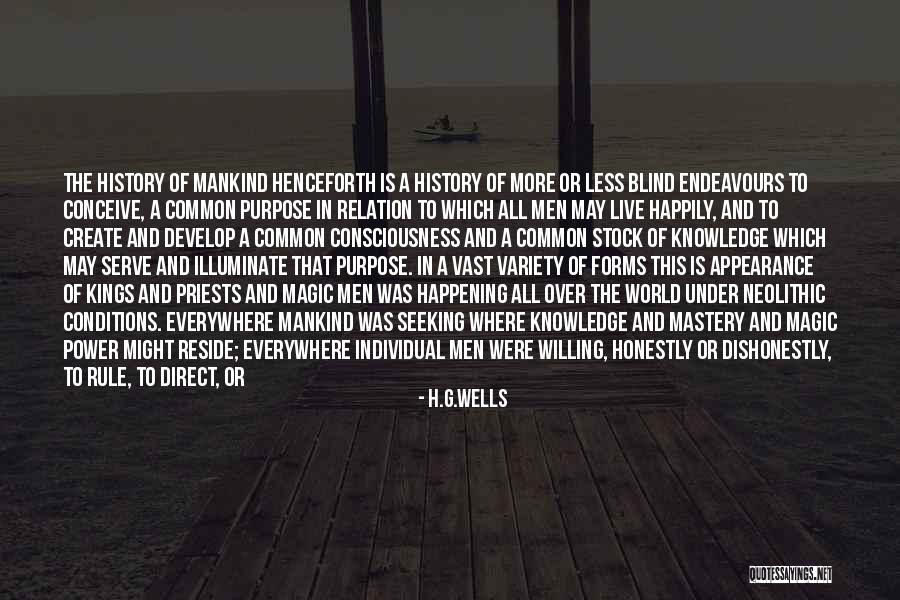
The history of mankind henceforth is a history of more or less blind endeavours to conceive, a common purpose in relation to which all men may live happily, and to create and develop a common consciousness and a common stock of knowledge which may serve and illuminate that purpose. In a vast variety of forms this is appearance of kings and priests and magic men was happening all over the world under Neolithic conditions. Everywhere mankind was seeking where knowledge and mastery and magic power might reside; everywhere individual men were willing, honestly or dishonestly, to rule, to direct, or to be the magic beings who would reconcile the confusions of the community. Another — H.G.Wells
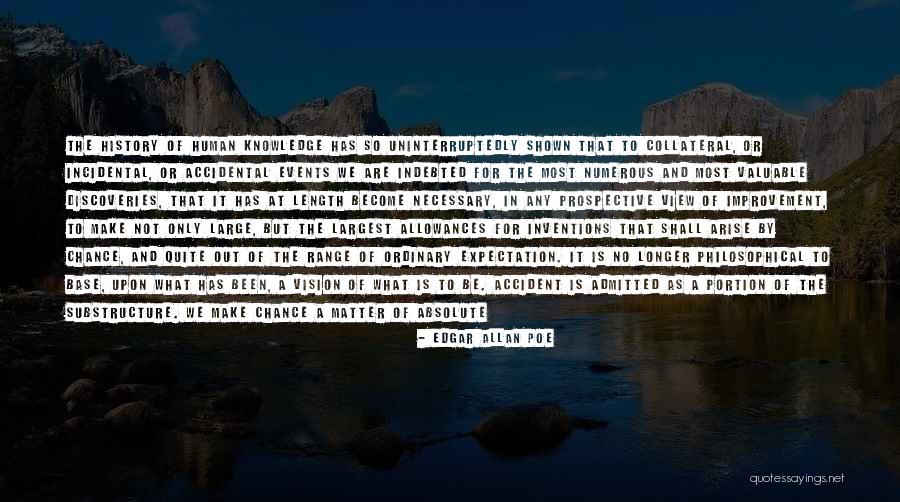
The history of human knowledge has so uninterruptedly shown that to collateral, or incidental, or accidental events we are indebted for the most numerous and most valuable discoveries, that it has at length become necessary, in any prospective view of improvement, to make not only large, but the largest allowances for inventions that shall arise by chance, and quite out of the range of ordinary expectation. It is no longer philosophical to base, upon what has been, a vision of what is to be. Accident is admitted as a portion of the substructure. We make chance a matter of absolute calculation. We subject the unlooked for and unimagined, to the mathematical formulae of the schools. — Edgar Allan Poe








